In Focus This Week
Elections officials gather in Detroit
National Association of Election Officials holds 39th Annual Conference
By M. Mindy Moretti
electionline.org
We won’t soon forget the Motor City.
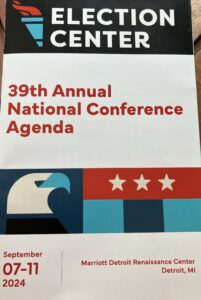 With less than two months to go till the November 2024 election, more than 500 state and local elections officials were joined by other elections-adjacent attendees for the National Association of Election Officials’ (The Election Center) 39th Annual Conference in Detroit, Michigan.
With less than two months to go till the November 2024 election, more than 500 state and local elections officials were joined by other elections-adjacent attendees for the National Association of Election Officials’ (The Election Center) 39th Annual Conference in Detroit, Michigan.
Continuing on a successful change of format which debuted in 2023, day one of the conference was dedicated to updates from the executive team and attendees heard from representatives of every one of the breakout sessions held on Tuesday. The “speed-dating” approach provided all attendees exposure to content that they physically could participate in given the simultaneous tracts of programming.
For the break-out sessions there were tracks on Security & Technology, Communications & Research, Studies, Reports & Policy, Management, Training & Logistics, and Connections, Associations & Open Session.
In addition to the plenary sessions and workshops, there were dozens of vendors in the exhibit hall, the Stanford University D. School presented a poster exhibit in the main conference area, awards were presented, CERA graduation held, a worldwide movie premier, a tour of local elections offices and there may have been a bit of fun too.
Keynote Speakers
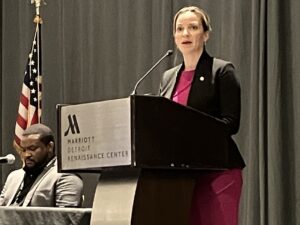
Michigan Secretary of State Jocelyn Benson.
In addition to hearing from all the break-out speakers, on Monday, those in attendance were treated to several keynote speakers including Detroit City Clerk Janice Winfrey, Wayne County, Michigan Clerk Cathy Garrett and Michigan Secretary of State Jocelyn Benson.
In her remarks, Garrett noted that “This has been a treat to be amongst you. It’s like one big therapy session because we all feel each other’s pain.”
During her remarks, Benson, who testified before Congress later in the week, compared the current situation elections officials are facing as a storm. “We are on the precipice of a great moment,” Benson said. “We must find courage and strength in the moment to walk through the storm together.”
CISA Director Jen Easterly also addressed the attendees on Monday. With the coming anniversary of September 11 on many people’s minds and the threats elections workers and officials are facing daily Easterly spoke about the critical work officials are continuing to do in the face of adversity.
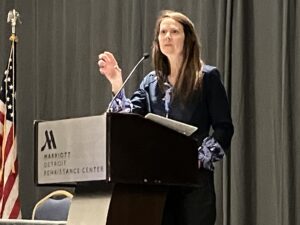
CISA Director Jen Easterly.
“You all know we are facing the most complex threat environment yet for an election cycle. You all know how much hard work goes into ensuring the security and integrity of our democratic process. And knowing ALL of that, you chose to be part of this sacred mission. You chose to be part of this distinguished community entrusted to protect the most critically important part of our democracy, our elections process,” she said.
“And while this is a tall order, this community has, without fail, delivered safe and secure elections for the American people since the start of this republic. You have faced all sorts of Election Day and voting period criceses from natural disasters to global pandemics. But as weeks like this one remind us, our nation has also held elections in the face of more nebulous or existential threats to our democracy. Time and again we have prevailed, regardless of context and circumstance. The result of your good work and the work done by the election officials who came before you is that this country’s secure and resilient elections have become the truest indicator that our democracy is strong and thriving.”
Easterly also stressed that with the continuing threats to our elections that elections officials are not alone.
You should also know that you are not expected to take on these burdens alone. You are NOT alone in this fight. Defending our democratic process is a top priority at every level of government from the federal to the state to the local,” Easterly said. Noting that there were federal officials from many different agencies on hand to talk about the threats elections officials are facing and how they can help.
Award Winners and Professional Practice papers
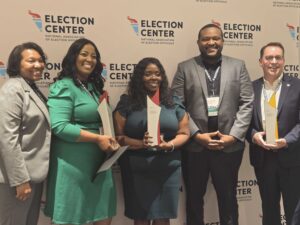
Shauna Dozier, Charlotte Sosebee, Veronica Degraffenreid, Derek Bowens and Dean Logan (accepting on behalf of Cathy Darling Allen).
The Election Center Board of Directors bestows the Hall of Fame designation to outstanding individuals in the profession. Any member of the National Association of Election Officials may nominate another member for this distinction. The Board of Directors also bestows the Lifetime Achievement Award to recipients for service to the profession and to the Election Center. This honor entitles recipients to free membership in perpetuity and registration and classes at member costs.
This year’s Hall of Fame winners were: Veronica Degraffenreid, former interim secretary of state for Pennsylvania who is currently Senior Manager of Strategic Partnerships, Elections & Government at the Brennan Center and Charlotte Sosebee, director of Elections and Voter Registration with Athens-Clarke County, Georgia. Former Shasta County Clerk & Recorder Cathy Darling Allen received the Lifetime Achievement Award.
The conference closed out with the annual Professional Practice Papers awards ceremony.
- Beacon Award: Henderson City, Nevada Kids Vote
- Eagle Award: Ada County, Idaho Ballot Verifier
- Eagle Award: Johnson County, Kansas Candidate Portal
- Freedom Award: San Benito County, California Ride Alongs
- Guardian Award: Santa Fe County, New Mexico Project Bruno
- Independence Award: Los Angeles County In-person Voting Incarcerated Individuals
- Independence Award: Colorado Department of State Eligible Confined Citizens
- Stars & Stripes Award: Dubuque County, Iowa Library Bookmarks
- Stewardship Award: King County, Washington Online Signature
- Democracy Award: Palm Beach County Florida No Wait Inside
In addition, there were 18 People’s Choice Award winners. There will be much more to come about the winning papers in the months ahead, including featuring many of the at the February workshops in Little Rock, Arkansas.
CERA Graduates
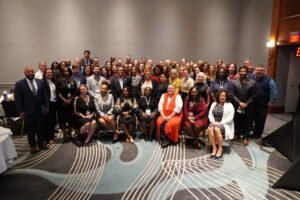
The Class of 2024
This year, 121 people graduated from the CERA program. It’s the largest class yet and more than 50 of them were on hand to receive their certificates and be recognized for all their hard work. As each graduate came up to receive their certificate, some of their thoughts about the program and their achievement were displayed. While each graduate had their own reasons for getting a CERA certificate, many of them talked about how taking the CERA courses not only increased their knowledge, but also brought them in contact with so many other elections officials who are experiencing the same things. “The CERA program is like the bar in Cheers. Everyone is welcoming. You get excited when you see someone you know. You pick up good bits of information,” said Fred DeCaro, registrar of voters for the Town of Greenwich, Connecticut. Nobody ever gets tired of talking about the topic. And you look forward to the next time you can all get together and do it again!”
The Officials
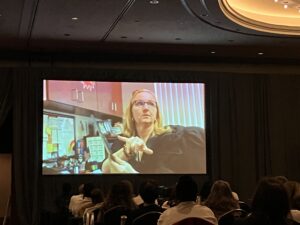
Tonya Winchman, Deficance Co., Ohio director of elections.
On Monday night, those in attendance were treated to the world premier of “The Officials,” a new film by Margo Guernsey and Sara Archambault and TIME Studios. The 25-minute movie offers a behind-the-scenes look at a politically diverse group of election officials who, despite facing increased threats, harassment and intimidation, remain committed to serving their communities by running secure elections and ensuring every eligible vote is counted accurately. Following the movie, the filmmakers and elections officials featured in the film participated in a panel discussion. The movie will make its public debut on September 17 on the TIME website. Issue One developed this companion toolkit to help amplify the film’s message and prompt important conversations about the role that these dedicated public servants play in ensuring free and fair elections.
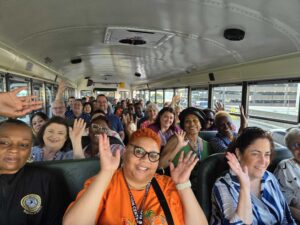
Loaded up and ready to tour the Detroit Elections offices.
Tour of Detroit Elections
On the final day of the conference, more than 100 attendees loaded up on tricked-out old school American school buses and were treated to a tour of the Detroit Elections office by Clerk Winfrey and her team.
electionline Daily News Email
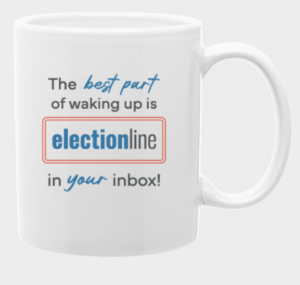 What’s the best part of waking up? electionline Daily News in your inbox of course so be sure to sign up for your daily dose.
What’s the best part of waking up? electionline Daily News in your inbox of course so be sure to sign up for your daily dose.
Each morning you’ll receive the top headlines of the day, plus a listing of states featured in that day’s news round up.
To sign up, simply visit our site and provide us with your email and you’ll begin receiving the news in your inbox each morning.
We Google so you don’t have to!
New from CEIR
Innovative ways to register voters spread across the country
Over the last two decades, a number of states have introduced new ways to make voter registration easier and more secure. The Center for Election Innovation and Research (CEIR) released a report “The Expansion of Innovative Voter Registration Methods, 2000-2024.” These  include online voter registration (OVR), same-day voter registration (SDR), and automatic voter registration (AVR). With the support of lawmakers and governors from both parties, 46 states and Washington, D.C., will have at least one of these in 2024—a big jump from just seven states in 2000. Fifteen states will have two, and 14 states plus Washington, D.C., will have all three.
include online voter registration (OVR), same-day voter registration (SDR), and automatic voter registration (AVR). With the support of lawmakers and governors from both parties, 46 states and Washington, D.C., will have at least one of these in 2024—a big jump from just seven states in 2000. Fifteen states will have two, and 14 states plus Washington, D.C., will have all three.
Some registration requirements come from the federal level and apply to all states. The Help America Vote Act of 2002, for example, set rules for verifying a voter’s identity, like requiring a driver’s license number or the last four digits of a Social Security number. But states can choose which, if any, of the three innovative methods of voter registration to adopt.
These additional registration methods make it easier for people to register or update their registration. In states with OVR, AVR, and SDR, people can register online, automatically while getting a driver’s license, or at the polling place. AVR keeps records current by updating them automatically, and SDR allows people who missed the registration deadline or whose records were incorrect or removed accidentally to still vote.
“Options like online voter registration, same day registration, and automatic voter registration lead to more accurate and complete voter lists,” says David Becker, Founder and Executive Director of CEIR. “Offering multiple methods to register to vote makes it easier to prepare for elections and reduces problems on Election Day, which leads to a smoother voting experience.”
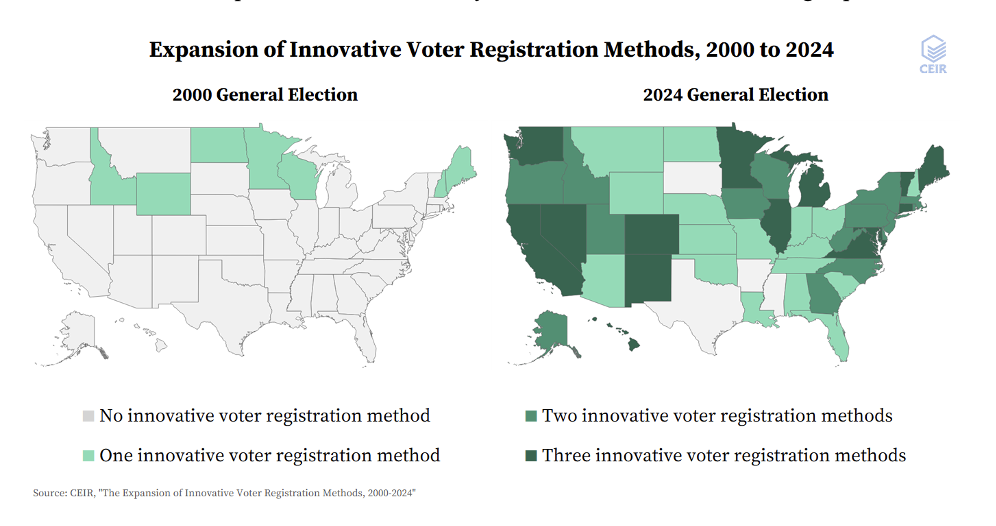
Election Security Updates
 News From CISA: The Cybersecurity and Infrastructure Agency (CISA) released two election security checklists as part of the comprehensive suite of resources available for election officials, the Physical Security Checklist for Election Offices and Election Infrastructure Cybersecurity Readiness and Resilience Checklist. These checklists are tools to quickly review existing practices and take steps to enhance physical and cyber resilience in preparation for election day. “Election officials around the country are unwavering in their commitment to enhance the cyber and physical security of election infrastructure to meet an evolving threat environment. As election officials and their teams enter into final preparations for November, these checklists help highlight some of the most common threat vectors, security practices, and resilience measures for consideration,” said CISA Senior Advisor, Cait Conley. These checklists provide a series of questions to guide preparation for potential cyber and physical security incidents that may impact election infrastructure. They help election officials identify areas to potentially enhance physical security, operational resilience, and cybersecurity at election infrastructure facilities and take action to implement low- or no-cost options in the short term. For more information, please click here and check out #Protect2024 for the latest information regarding election security.
News From CISA: The Cybersecurity and Infrastructure Agency (CISA) released two election security checklists as part of the comprehensive suite of resources available for election officials, the Physical Security Checklist for Election Offices and Election Infrastructure Cybersecurity Readiness and Resilience Checklist. These checklists are tools to quickly review existing practices and take steps to enhance physical and cyber resilience in preparation for election day. “Election officials around the country are unwavering in their commitment to enhance the cyber and physical security of election infrastructure to meet an evolving threat environment. As election officials and their teams enter into final preparations for November, these checklists help highlight some of the most common threat vectors, security practices, and resilience measures for consideration,” said CISA Senior Advisor, Cait Conley. These checklists provide a series of questions to guide preparation for potential cyber and physical security incidents that may impact election infrastructure. They help election officials identify areas to potentially enhance physical security, operational resilience, and cybersecurity at election infrastructure facilities and take action to implement low- or no-cost options in the short term. For more information, please click here and check out #Protect2024 for the latest information regarding election security.
 News from Verified Voting: Verified Voting, is pleased to announce its participation in Access Ready Inc.’s “Stand By Me” On-Call Consulting Program. This partnership marks another action toward fostering significant collaboration between the voting security and accessible voting communities, two groups that have historically faced challenges in aligning their objectives. “Working together, we hope to find a collaborative path that is inclusive of security and accessibility,” said Douglas George Towne, Chair and CEO of Access Ready, Inc. “By joining forces with Verified Voting, we are committed to creating a more inclusive electoral process that upholds both the integrity and accessibility of voting for all.” “We are excited to collaborate with Access Ready to continue bridging the gap between security and accessibility and to ensure a more inclusive democracy for all,” said Pamela Smith, President & CEO of Verified Voting. “Our vision is to ensure that every voter can cast an effective ballot without barriers and have justified confidence that their vote counts.” Through the “Stand By Me” program, Verified Voting will benefit from Access Ready’s expertise in accessible technology, receive guidance on best practices, and participate in strategic discussions aimed at enhancing both security and accessibility in the voting process. The collaboration aims to build more trust and understanding between the two communities, ultimately leading to more secure and accessible elections.
News from Verified Voting: Verified Voting, is pleased to announce its participation in Access Ready Inc.’s “Stand By Me” On-Call Consulting Program. This partnership marks another action toward fostering significant collaboration between the voting security and accessible voting communities, two groups that have historically faced challenges in aligning their objectives. “Working together, we hope to find a collaborative path that is inclusive of security and accessibility,” said Douglas George Towne, Chair and CEO of Access Ready, Inc. “By joining forces with Verified Voting, we are committed to creating a more inclusive electoral process that upholds both the integrity and accessibility of voting for all.” “We are excited to collaborate with Access Ready to continue bridging the gap between security and accessibility and to ensure a more inclusive democracy for all,” said Pamela Smith, President & CEO of Verified Voting. “Our vision is to ensure that every voter can cast an effective ballot without barriers and have justified confidence that their vote counts.” Through the “Stand By Me” program, Verified Voting will benefit from Access Ready’s expertise in accessible technology, receive guidance on best practices, and participate in strategic discussions aimed at enhancing both security and accessibility in the voting process. The collaboration aims to build more trust and understanding between the two communities, ultimately leading to more secure and accessible elections.
Election News This Week
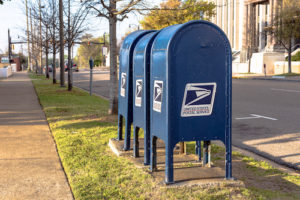 Postal News: This week, the National Association of Secretaries of State, the National Association of State Election Directors and local election officials from across the country sent a letter to the U.S. Postal Service warning that problems with the nation’s mail delivery system threaten to disenfranchise voters in the upcoming presidential election, telling the head of the U.S. Postal Service that it hasn’t fixed persistent deficiencies. the officials said that over the past year, including the just-concluded primary season, mailed ballots that were postmarked on time were received by local election offices days after the deadline to be counted. They also noted that properly addressed election mail was being returned to them as undeliverable, a problem that could automatically send voters to inactive status through no fault of their own, potentially creating chaos when those voters show up to cast a ballot. The officials also said that repeated outreach to the Postal Service to resolve the issues had failed and that the widespread nature of the problems made it clear these were “not one-off mistakes or a problem with specific facilities. Instead, it demonstrates a pervasive lack of understanding and enforcement of USPS policies among its employees.” “We implore you to take immediate and tangible corrective action to address the ongoing performance issues with USPS election mail service,” they added. “Failure to do so will risk limiting voter participation and trust in the election process.” The Postal Service reiterated assurances that it’s well positioned to swiftly deliver election mail despite being in the midst of a network modernization that has caused some delivery hiccups. Mail is currently being delivered in 2.7 days on average, officials said, but the Postal Service is still urging voters not to procrastinate.
Postal News: This week, the National Association of Secretaries of State, the National Association of State Election Directors and local election officials from across the country sent a letter to the U.S. Postal Service warning that problems with the nation’s mail delivery system threaten to disenfranchise voters in the upcoming presidential election, telling the head of the U.S. Postal Service that it hasn’t fixed persistent deficiencies. the officials said that over the past year, including the just-concluded primary season, mailed ballots that were postmarked on time were received by local election offices days after the deadline to be counted. They also noted that properly addressed election mail was being returned to them as undeliverable, a problem that could automatically send voters to inactive status through no fault of their own, potentially creating chaos when those voters show up to cast a ballot. The officials also said that repeated outreach to the Postal Service to resolve the issues had failed and that the widespread nature of the problems made it clear these were “not one-off mistakes or a problem with specific facilities. Instead, it demonstrates a pervasive lack of understanding and enforcement of USPS policies among its employees.” “We implore you to take immediate and tangible corrective action to address the ongoing performance issues with USPS election mail service,” they added. “Failure to do so will risk limiting voter participation and trust in the election process.” The Postal Service reiterated assurances that it’s well positioned to swiftly deliver election mail despite being in the midst of a network modernization that has caused some delivery hiccups. Mail is currently being delivered in 2.7 days on average, officials said, but the Postal Service is still urging voters not to procrastinate.
 News from the Hill: Republicans on the House Administration Committee at a Wednesday hearing argued that legislation to bar people from voting who are not citizens — something already illegal — is what’s needed to prepare for the November elections. But Democratic secretaries of state in battleground states told committee members they are more concerned about the detailed threats they and their election workers are experiencing resulting from election misinformation. Three Democratic secretaries of state, Adrian Fontes of Arizona, Jocelyn Benson of Michigan and Maggie Toulouse Oliver of New Mexico, said that people who are not citizens voting in federal elections do not constitute a problem, despite the GOP push for legislation barring the act. “There’s no evidence that noncitizens are voting and if they were, it would be easy to prove, since voting records are public. And despite numerous organizations spending a lot of money to try to convince people that noncitizens are voting, none of these groups have actually been able to provide any evidence of it,” Benson said. The three Republican secretaries of state at the hearing, Frank LaRose of Ohio, Cord Byrd of Florida and Mac Warner of West Virginia, argued that federal legislation requiring proof of citizenship to register is necessary to prevent people who are not citizens from voting and to secure elections. Research has found that noncitizen voting rarely happens. “The fact is it’s rare, but we keep it rare by enforcing the law,” LaRose said of such voting. “It is my duty to carry that out. Unfortunately, that duty is not as easy to carry out as it should be.” Legislators also discussed threats to election workers, funding and a three-year-old executive order on voter registration efforts.
News from the Hill: Republicans on the House Administration Committee at a Wednesday hearing argued that legislation to bar people from voting who are not citizens — something already illegal — is what’s needed to prepare for the November elections. But Democratic secretaries of state in battleground states told committee members they are more concerned about the detailed threats they and their election workers are experiencing resulting from election misinformation. Three Democratic secretaries of state, Adrian Fontes of Arizona, Jocelyn Benson of Michigan and Maggie Toulouse Oliver of New Mexico, said that people who are not citizens voting in federal elections do not constitute a problem, despite the GOP push for legislation barring the act. “There’s no evidence that noncitizens are voting and if they were, it would be easy to prove, since voting records are public. And despite numerous organizations spending a lot of money to try to convince people that noncitizens are voting, none of these groups have actually been able to provide any evidence of it,” Benson said. The three Republican secretaries of state at the hearing, Frank LaRose of Ohio, Cord Byrd of Florida and Mac Warner of West Virginia, argued that federal legislation requiring proof of citizenship to register is necessary to prevent people who are not citizens from voting and to secure elections. Research has found that noncitizen voting rarely happens. “The fact is it’s rare, but we keep it rare by enforcing the law,” LaRose said of such voting. “It is my duty to carry that out. Unfortunately, that duty is not as easy to carry out as it should be.” Legislators also discussed threats to election workers, funding and a three-year-old executive order on voter registration efforts.
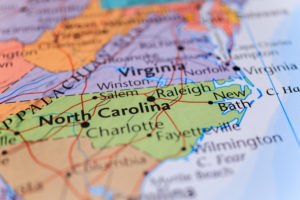 Costly Decision: Following the ruling of the North Carolina Supreme Court to remove presidential candidate Robert Kennedy Jr. from the November ballot, state and local elections officials in the Tar Heel State are scrambling to reprint ballots, which had been scheduled to go in the mail on Friday, September 6. Not only does it seem likely that counties will miss the September UOCAVA deadline, but they are also spending tens of thousands of dollars to reprint the ballots. Guilford County says it will cost them about $12,000 to reprint ballots. Wake County Board of Elections member Gerry Cohen said Wake County has about 20,000 ballots to reprint. He said it cost the county about $66,000 to reprint the ballots. “Everything has been scrapped,” Cohen said of the ballots initially printed. “By late Monday night, we knew that the Supreme Court had decided that we did have to reprint. So, we were preparing in advance of that to keep things timely,” said Kelly McPherson, director of the Dare County Board of Elections. McPherson estimated the cost for the reprinting, coding and layout to be between $15,000 and $20,000 that the county will need to pay. Cherokee County Board of Elections Director Leighsa Jones told a local television station that while she doesn’t know the exact cost, she expects the ballot printing process to be in the ‘thousands’ of dollars. Cherokee County Manager Randy Wiggins says because this is not optional, it will likely trigger a budget amendment for commissioners to debate soon. He says the money would likely come out of a contingency fund that the county already has in place for ‘surprises’ like this. The Haywood County Board of Elections had over 800 ballots packaged and ready to be mailed by last Friday morning. “It affects each and every county exactly the same way,” said Robert Inman, director board of elections. “All of the pre-printed material is something you have to order and something that takes time to produce.”
Costly Decision: Following the ruling of the North Carolina Supreme Court to remove presidential candidate Robert Kennedy Jr. from the November ballot, state and local elections officials in the Tar Heel State are scrambling to reprint ballots, which had been scheduled to go in the mail on Friday, September 6. Not only does it seem likely that counties will miss the September UOCAVA deadline, but they are also spending tens of thousands of dollars to reprint the ballots. Guilford County says it will cost them about $12,000 to reprint ballots. Wake County Board of Elections member Gerry Cohen said Wake County has about 20,000 ballots to reprint. He said it cost the county about $66,000 to reprint the ballots. “Everything has been scrapped,” Cohen said of the ballots initially printed. “By late Monday night, we knew that the Supreme Court had decided that we did have to reprint. So, we were preparing in advance of that to keep things timely,” said Kelly McPherson, director of the Dare County Board of Elections. McPherson estimated the cost for the reprinting, coding and layout to be between $15,000 and $20,000 that the county will need to pay. Cherokee County Board of Elections Director Leighsa Jones told a local television station that while she doesn’t know the exact cost, she expects the ballot printing process to be in the ‘thousands’ of dollars. Cherokee County Manager Randy Wiggins says because this is not optional, it will likely trigger a budget amendment for commissioners to debate soon. He says the money would likely come out of a contingency fund that the county already has in place for ‘surprises’ like this. The Haywood County Board of Elections had over 800 ballots packaged and ready to be mailed by last Friday morning. “It affects each and every county exactly the same way,” said Robert Inman, director board of elections. “All of the pre-printed material is something you have to order and something that takes time to produce.”
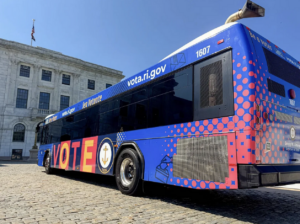 Get on the Bus: Channeling the “voting isn’t marriage, it’s public transit” meme, Rhode Island Secretary of State Gregg Amore unveiled a new elections bus last week. The Rhode Island Public Transit Authority (RIPTA) will display a new bus wrap, part of the RI Department of State’s advertising campaign to encourage Rhode Islanders to vote, and to remind voters of upcoming election dates and deadlines. “As election officials, we want to ensure not only that voters have the information they need, but that they get their information from reliable, trusted sources,” said Secretary of State Gregg M. Amore. “In advance of both the September primary and November general elections, the RI Department of State has engaged in a robust advertising and communications campaign to encourage Rhode Islanders to contact their state and local elections officials with questions about the election. I’m looking forward to seeing this bus out on the street.” The RI Department of State’s 2024 advertising campaign includes radio, digital, print, and bus ads, all focused on the importance of getting elections information from trusted sources, like state and local elections officials. RIPTA Interim CEO Christopher Durand joined the event to remind voters of how to plan their trip to the polls using public transit. “We appreciate the Secretary of State’s recognition of the value of public transit,” said Christopher Durand, Interim CEO of RIPTA. “Whether your destination is the polls, work, or school, we at RIPTA are dedicated to helping improve mobility options for all.”
Get on the Bus: Channeling the “voting isn’t marriage, it’s public transit” meme, Rhode Island Secretary of State Gregg Amore unveiled a new elections bus last week. The Rhode Island Public Transit Authority (RIPTA) will display a new bus wrap, part of the RI Department of State’s advertising campaign to encourage Rhode Islanders to vote, and to remind voters of upcoming election dates and deadlines. “As election officials, we want to ensure not only that voters have the information they need, but that they get their information from reliable, trusted sources,” said Secretary of State Gregg M. Amore. “In advance of both the September primary and November general elections, the RI Department of State has engaged in a robust advertising and communications campaign to encourage Rhode Islanders to contact their state and local elections officials with questions about the election. I’m looking forward to seeing this bus out on the street.” The RI Department of State’s 2024 advertising campaign includes radio, digital, print, and bus ads, all focused on the importance of getting elections information from trusted sources, like state and local elections officials. RIPTA Interim CEO Christopher Durand joined the event to remind voters of how to plan their trip to the polls using public transit. “We appreciate the Secretary of State’s recognition of the value of public transit,” said Christopher Durand, Interim CEO of RIPTA. “Whether your destination is the polls, work, or school, we at RIPTA are dedicated to helping improve mobility options for all.”
 Sticker News: Tess Gallo, a 13-year-old student from Miller Middle School, has been named the winner of the Ulster County, New York Board of Elections’ “I Voted” Sticker Contest. Her artwork will be produced and distributed at all early voting centers in Ulster County starting Saturday, October 26th, and will be available at all poll sites on Election Day, November 5th. Gallo will be honored with the prestigious “Pride of Ulster County” Award at an upcoming meeting of the Ulster County Legislature. This award highlights her dedication to fostering civic engagement and making a positive impact on our community. “The Ulster County Board of Elections would like to extend our heartfelt congratulations to Tess Gallo for her winning design,” said Elections Commissioners John Quigley and Ashley Torres. “We would also like to express our gratitude to the other finalists and all the
Sticker News: Tess Gallo, a 13-year-old student from Miller Middle School, has been named the winner of the Ulster County, New York Board of Elections’ “I Voted” Sticker Contest. Her artwork will be produced and distributed at all early voting centers in Ulster County starting Saturday, October 26th, and will be available at all poll sites on Election Day, November 5th. Gallo will be honored with the prestigious “Pride of Ulster County” Award at an upcoming meeting of the Ulster County Legislature. This award highlights her dedication to fostering civic engagement and making a positive impact on our community. “The Ulster County Board of Elections would like to extend our heartfelt congratulations to Tess Gallo for her winning design,” said Elections Commissioners John Quigley and Ashley Torres. “We would also like to express our gratitude to the other finalists and all the 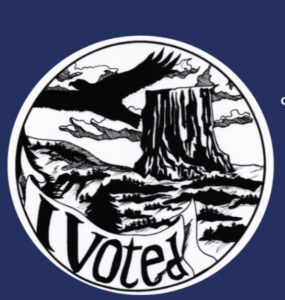 talented students who submitted their artwork for this year’s contest. We are honored to work with so many young people who want to make a difference.” More than 100 Ulster County students submitted unique “I Voted” election sticker designs in 2024, the highest number of submissions to date. Congratulations to the winners of the South Dakota “I Voted” sticker contest including: Art W. from Ms. Azures’ class at Takini School, Makenna C. from Ms. Clark’s class at Spearfish Middle School, Evelyn R. from Ms. Watt’s class at Elk Mountain Elementary School and Kynlee S. from Mrs. Gloe’s class at Stanley County Elementary School
talented students who submitted their artwork for this year’s contest. We are honored to work with so many young people who want to make a difference.” More than 100 Ulster County students submitted unique “I Voted” election sticker designs in 2024, the highest number of submissions to date. Congratulations to the winners of the South Dakota “I Voted” sticker contest including: Art W. from Ms. Azures’ class at Takini School, Makenna C. from Ms. Clark’s class at Spearfish Middle School, Evelyn R. from Ms. Watt’s class at Elk Mountain Elementary School and Kynlee S. from Mrs. Gloe’s class at Stanley County Elementary School
Personnel News: Michael Henne has been appointed to the Miami County, Ohio Board of Elections to fill the unexpired term of Republican Lance Ray, who died in August.
New Research and Resources
 National Task Force on Election Crises: False claims that noncitizens and other ineligible voters will commit widespread voter fraud in the November election have been circulating in recent months. Such allegations are dangerous because they erode trust in our election system and could sow doubt in the results. Navigating this issue may prove difficult because of conflicting media coverage, the complex intersection of various laws, and deliberate disinformation campaigns. For this reason, the National Task Force on Election Crises has put together a brief explainer for you, so that you and the people who rely on you for information will have the tools necessary to rebut these allegations and understand why it would not be possible for noncitizens to engage in widespread voter fraud. You can read the full paper here.
National Task Force on Election Crises: False claims that noncitizens and other ineligible voters will commit widespread voter fraud in the November election have been circulating in recent months. Such allegations are dangerous because they erode trust in our election system and could sow doubt in the results. Navigating this issue may prove difficult because of conflicting media coverage, the complex intersection of various laws, and deliberate disinformation campaigns. For this reason, the National Task Force on Election Crises has put together a brief explainer for you, so that you and the people who rely on you for information will have the tools necessary to rebut these allegations and understand why it would not be possible for noncitizens to engage in widespread voter fraud. You can read the full paper here.
Messaging Points:
- False claims of widespread noncitizen voting are designed to sow distrust in our elections and to potentially serve as pretext to undermine or challenge the rightful results.
- Under federal law, only eligible American citizens can register to vote and cast ballots in federal elections. These laws include the National Voter Registration Act (NVRA), the Help America Vote Act (HAVA), and the Illegal Immigration Reform and Immigrant Responsibility Act.
- The number of noncitizens who have been proven to have registered to vote in federal elections in the United States is miniscule—and the number of noncitizens who have attempted to vote is an even smaller fraction of that number.
- The extreme rarity of these events demonstrates how the system, with these measures and procedures, is functioning well to protect the integrity of our elections in this regard, and indicates that widespread noncitizen voting is not occurring.
 Election Hero Day Partner Toolkit: Election Hero Day is excited to officially share the 2024 Election Hero Day Partner Toolkit with you! This toolkit provides you with content to show your appreciation for election heroes on Monday, November 4, including: in-person activation best practices, resources to share on social media, and general messaging suggestions. (This is a resource not an instruction manual!) We invite you to customize this content, integrate it with your brand, and share on your channels. The partner toolkit also includes two important forms that will allow the Election Hero Day team to stay connected with your activations:
Election Hero Day Partner Toolkit: Election Hero Day is excited to officially share the 2024 Election Hero Day Partner Toolkit with you! This toolkit provides you with content to show your appreciation for election heroes on Monday, November 4, including: in-person activation best practices, resources to share on social media, and general messaging suggestions. (This is a resource not an instruction manual!) We invite you to customize this content, integrate it with your brand, and share on your channels. The partner toolkit also includes two important forms that will allow the Election Hero Day team to stay connected with your activations:
- Election Hero Day Partner Activation Plans: We’d love to know how you are planning to activate on or ahead of Monday, November 4, 2024. If you plan to host a tabling event, company lunch and learn, deliver snacks to an elections office, share content on social media, or any other in-person or virtual activation, please share details so we can help uplift the event!
- Share Your Story: Who is Your Election Hero: Do you have an election hero from your community or family that you would like to honor on Election Hero Day (November 4, 2024)? Fill out this brief form, and the Election Hero Day team will elevate these heroes and their stories through social and traditional media!
Ballot Measures, Legislation and Rulemaking
 Federal Legislation: Speaker Mike Johnson postponed a vote on September 11 on a temporary spending bill that would keep federal agencies and programs funded for six months as opposition from both parties thwarted his first attempt at avoiding a partial government shutdown in three weeks. The legislation to continue government funding when the new budget year begins on Oct. 1 includes a requirement that people registering to vote must provide proof of citizenship. Johnson, R-La., signaled that he was not backing off linking the two main components of the bill. “No vote today because we’re in the consensus building business here in Congress. With small majorities, that’s what you do,” Johnson told reporters. “We’re having thoughtful conversations, family conversations within the Republican conference and I believe we’ll get there.” Congress needs to pass a stopgap spending bill before Oct. 1 to avoid a federal shutdown just weeks before the election. The measure had been teed up for a vote on Wednesday afternoon, but Democrats are overwhelmingly opposed and enough Republicans had voiced opposition to raise serious doubts about whether the measure would pass. The House approved a bill with the proof of citizenship mandate back in July. Republicans believe there is value in revisiting the issue and making Democrats in competitive swing districts vote again. Democrats are calling on Johnson to “stop wasting time” on a bill that will not become law and to work with them on a short-term spending measure that has support from both parties. At the end of the day, they say no spending bill can pass without bipartisan support and buy-in from a Democratic-led Senate and White House. “Speaker Johnson, scrap your plan. Don’t just delay the vote. Find a better one that can pass in a bipartisan way,” Senate Majority Leader Chuck Schumer said in response to Johnson’s announcement. But Johnson wasn’t giving up on his proposal yet, saying House leadership would work on building support over the weekend. He said that ensuring that only U.S. citizens vote in federal elections is “the most pressing issue right now and we’re going to get this job done.”
Federal Legislation: Speaker Mike Johnson postponed a vote on September 11 on a temporary spending bill that would keep federal agencies and programs funded for six months as opposition from both parties thwarted his first attempt at avoiding a partial government shutdown in three weeks. The legislation to continue government funding when the new budget year begins on Oct. 1 includes a requirement that people registering to vote must provide proof of citizenship. Johnson, R-La., signaled that he was not backing off linking the two main components of the bill. “No vote today because we’re in the consensus building business here in Congress. With small majorities, that’s what you do,” Johnson told reporters. “We’re having thoughtful conversations, family conversations within the Republican conference and I believe we’ll get there.” Congress needs to pass a stopgap spending bill before Oct. 1 to avoid a federal shutdown just weeks before the election. The measure had been teed up for a vote on Wednesday afternoon, but Democrats are overwhelmingly opposed and enough Republicans had voiced opposition to raise serious doubts about whether the measure would pass. The House approved a bill with the proof of citizenship mandate back in July. Republicans believe there is value in revisiting the issue and making Democrats in competitive swing districts vote again. Democrats are calling on Johnson to “stop wasting time” on a bill that will not become law and to work with them on a short-term spending measure that has support from both parties. At the end of the day, they say no spending bill can pass without bipartisan support and buy-in from a Democratic-led Senate and White House. “Speaker Johnson, scrap your plan. Don’t just delay the vote. Find a better one that can pass in a bipartisan way,” Senate Majority Leader Chuck Schumer said in response to Johnson’s announcement. But Johnson wasn’t giving up on his proposal yet, saying House leadership would work on building support over the weekend. He said that ensuring that only U.S. citizens vote in federal elections is “the most pressing issue right now and we’re going to get this job done.”
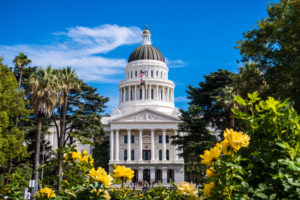 California: A new bill that passed the state Legislature last week would significantly increase the number of registered voters in California by requiring eligible voters be automatically registered when they get a state I.D., driver’s license or change their address at the DMV. Advocates say SB 299, which is now before Gov. Gavin Newsom, would especially impact young people and predominantly Black, Latino and Asian American and Pacific Islander (AAPI) communities. “We recognize that voter registration is a key barrier for our communities to exercise our constitutional rights to vote,” said Sydney Fang, the policy director at Asian, Americans and Pacific Islanders for Civic Empowerment (AAPI Force). “And we know that democracy only works when all eligible citizens have access to the ballot.” The bill aims to reduce that percentage through technology, allowing the agency to check whether a person is eligible to be registered. If their information clears the system and demonstrates they’re an eligible voter, they’d automatically be put on the voter rolls. The bill gives the California Secretary of State authority on the selection and implementation of the technology. Newsom will have until the end of September to sign the bill. If signed, it could go into effect as early as 2030.
California: A new bill that passed the state Legislature last week would significantly increase the number of registered voters in California by requiring eligible voters be automatically registered when they get a state I.D., driver’s license or change their address at the DMV. Advocates say SB 299, which is now before Gov. Gavin Newsom, would especially impact young people and predominantly Black, Latino and Asian American and Pacific Islander (AAPI) communities. “We recognize that voter registration is a key barrier for our communities to exercise our constitutional rights to vote,” said Sydney Fang, the policy director at Asian, Americans and Pacific Islanders for Civic Empowerment (AAPI Force). “And we know that democracy only works when all eligible citizens have access to the ballot.” The bill aims to reduce that percentage through technology, allowing the agency to check whether a person is eligible to be registered. If their information clears the system and demonstrates they’re an eligible voter, they’d automatically be put on the voter rolls. The bill gives the California Secretary of State authority on the selection and implementation of the technology. Newsom will have until the end of September to sign the bill. If signed, it could go into effect as early as 2030.
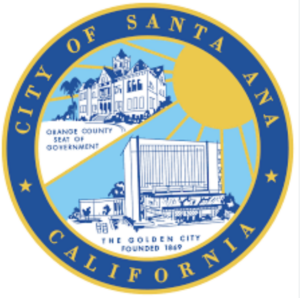 Santa Ana, California: When voters go to the polls in November in the Orange County city of Santa Ana, they’ll be deciding if noncitizens should be allowed to vote in some elections? If passed, Measure DD would amend Santa Ana’s municipal charter and allow non-citizen residents of the city, both documented and undocumented, to vote in all local elections. That includes mayoral and city council races, proposed sales tax increases on the ballot and municipal bond measures. Local immigrant rights advocates like Carlos Perea argue that keeping non-citizens from voting takes tax-paying residents out of the political process. “We knew the residents were demanding political representation because we realized that, if we wanted to truly change how City Hall runs, we needed to change who’s allowed to vote,” he said. “This is an issue that will change the game in the city.” But opponents have argued that implementing the measure would cost the cash-strapped city upwards of $10 million. They also say that voting, at all levels of government, should remain a right of citizenship and if non-citizens want a bigger voice in civic affairs, they should work to become naturalized.
Santa Ana, California: When voters go to the polls in November in the Orange County city of Santa Ana, they’ll be deciding if noncitizens should be allowed to vote in some elections? If passed, Measure DD would amend Santa Ana’s municipal charter and allow non-citizen residents of the city, both documented and undocumented, to vote in all local elections. That includes mayoral and city council races, proposed sales tax increases on the ballot and municipal bond measures. Local immigrant rights advocates like Carlos Perea argue that keeping non-citizens from voting takes tax-paying residents out of the political process. “We knew the residents were demanding political representation because we realized that, if we wanted to truly change how City Hall runs, we needed to change who’s allowed to vote,” he said. “This is an issue that will change the game in the city.” But opponents have argued that implementing the measure would cost the cash-strapped city upwards of $10 million. They also say that voting, at all levels of government, should remain a right of citizenship and if non-citizens want a bigger voice in civic affairs, they should work to become naturalized.
 New Hampshire: Gov. Chris Sununu has days to decide the fate of a bill that would require proof of voter identification with no exceptions in future New Hampshire elections, after the legislation arrived at his desk September 9. Opponents of the bill are attempting to persuade him to veto it. House Bill 1569, which passed the Legislature in May, would require voters to produce a photo ID on Election Day or be barred from voting. It would eliminate the current law that allows people who show up to vote without photo ID to sign an affidavit attesting to their identity under penalty of perjury. And it would require that people voting in New Hampshire for the first time produce documentary evidence of their U.S. citizenship through a passport, birth certificate, or other document in order to register to vote. The bill will not affect the Nov. 5 general election if Sununu signs it this week. It is written to take effect 60 days after his signature. Sununu has been skeptical of signing the bill, stating that he is not interested in making further changes to state election laws when asked about HB 1569. But voting rights and disability rights groups are now urging Sununu to veto the bill entirely this week.
New Hampshire: Gov. Chris Sununu has days to decide the fate of a bill that would require proof of voter identification with no exceptions in future New Hampshire elections, after the legislation arrived at his desk September 9. Opponents of the bill are attempting to persuade him to veto it. House Bill 1569, which passed the Legislature in May, would require voters to produce a photo ID on Election Day or be barred from voting. It would eliminate the current law that allows people who show up to vote without photo ID to sign an affidavit attesting to their identity under penalty of perjury. And it would require that people voting in New Hampshire for the first time produce documentary evidence of their U.S. citizenship through a passport, birth certificate, or other document in order to register to vote. The bill will not affect the Nov. 5 general election if Sununu signs it this week. It is written to take effect 60 days after his signature. Sununu has been skeptical of signing the bill, stating that he is not interested in making further changes to state election laws when asked about HB 1569. But voting rights and disability rights groups are now urging Sununu to veto the bill entirely this week.
 Oakridge, Oregon Ballot Measure: Voters in Oakridge will decide whether to temporarily adopt a rating-based voting system for city races. Earlier this year, Oakridge’s City Council voted 5 to 1 to place a STAR Voting measure on the ballot. The system would allow voters to rate multiple candidates on a scale of zero to five stars, rather than choosing just one. The two highest score-earners would then advance to an automatic run-off. All ballots would be recounted, and the finalist preferred by more people would win. If the Oakridge measure passes, the city would try out the system for three elections. Afterwards, voters could adopt STAR Voting permanently, or drop it. City Administrator James Cleavenger said Oakridge currently has no primary, and there’s frequently more than two candidates in a race, which leads to vote-splitting. He said STAR Voting could help address this problem.
Oakridge, Oregon Ballot Measure: Voters in Oakridge will decide whether to temporarily adopt a rating-based voting system for city races. Earlier this year, Oakridge’s City Council voted 5 to 1 to place a STAR Voting measure on the ballot. The system would allow voters to rate multiple candidates on a scale of zero to five stars, rather than choosing just one. The two highest score-earners would then advance to an automatic run-off. All ballots would be recounted, and the finalist preferred by more people would win. If the Oakridge measure passes, the city would try out the system for three elections. Afterwards, voters could adopt STAR Voting permanently, or drop it. City Administrator James Cleavenger said Oakridge currently has no primary, and there’s frequently more than two candidates in a race, which leads to vote-splitting. He said STAR Voting could help address this problem.
 Luzerne County, Pennsylvania: A proposed Luzerne County “election worker protection ordinance” received the four of 11 council votes required to keep it under consideration this week, and Councilwoman Joanna Bryn Smith, the ordinance author, said she already has submitted a revised version to address some concerns. For the ordinance to pass, a public hearing and majority council approval would be necessary at a future meeting. Bryn Smith sent her colleagues the revision, saying in her email she “made some changes upon reflection and Mr. Chairman’s comments in the press.” Council Chairman John Lombardo and county District Attorney Sam Sanguedolce both criticized the original proposal due to mandates it placed on the county District Attorney’s Office. It lists prohibited actions related to interference, intimidation, retaliation and harassment. Under the interference listing, for example, it states no person shall obstruct, hinder or otherwise interfere with an election official in the performance of their duties. “This includes physical, electronic or psychological barriers that impede election officials’ ability to conduct elections,” it said. The other prohibitions: Intimidation: It is unlawful to threaten, coerce, or attempt to influence an election official through fear, including the use of force, threats of force, or disclosing personal information of election officials online (doxxing). Retaliation: Retaliating against an election official for performing their duties, such as by threatening job security, personal safety, or publicly maligning their character, is prohibited. Harassment: Persistent actions, including verbal or physical conduct designed to disturb or upset an election official, are unlawful. This includes the use of derogatory or threatening language aimed at election officials through any medium. The proposal asserts these prohibitions are “in alignment” with the Pennsylvania Crimes Code, the state Election Code and applicable federal laws. The ordinance would apply to actions committed within the county and harassment or intimidation acts that originate from outside the county, it said. “This ensures that perpetrators cannot evade responsibility due to physical location, emphasizing that protections cover both digital and physical threats,” it said. The ordinance mandates the election bureau to immediately document any applicable incidents. Finally, the proposal imposes a maximum $1,000 fine or up to 90 days in the county jail if a fine is not paid by an offender found guilty. It makes violations subject to summary enforcement proceedings.
Luzerne County, Pennsylvania: A proposed Luzerne County “election worker protection ordinance” received the four of 11 council votes required to keep it under consideration this week, and Councilwoman Joanna Bryn Smith, the ordinance author, said she already has submitted a revised version to address some concerns. For the ordinance to pass, a public hearing and majority council approval would be necessary at a future meeting. Bryn Smith sent her colleagues the revision, saying in her email she “made some changes upon reflection and Mr. Chairman’s comments in the press.” Council Chairman John Lombardo and county District Attorney Sam Sanguedolce both criticized the original proposal due to mandates it placed on the county District Attorney’s Office. It lists prohibited actions related to interference, intimidation, retaliation and harassment. Under the interference listing, for example, it states no person shall obstruct, hinder or otherwise interfere with an election official in the performance of their duties. “This includes physical, electronic or psychological barriers that impede election officials’ ability to conduct elections,” it said. The other prohibitions: Intimidation: It is unlawful to threaten, coerce, or attempt to influence an election official through fear, including the use of force, threats of force, or disclosing personal information of election officials online (doxxing). Retaliation: Retaliating against an election official for performing their duties, such as by threatening job security, personal safety, or publicly maligning their character, is prohibited. Harassment: Persistent actions, including verbal or physical conduct designed to disturb or upset an election official, are unlawful. This includes the use of derogatory or threatening language aimed at election officials through any medium. The proposal asserts these prohibitions are “in alignment” with the Pennsylvania Crimes Code, the state Election Code and applicable federal laws. The ordinance would apply to actions committed within the county and harassment or intimidation acts that originate from outside the county, it said. “This ensures that perpetrators cannot evade responsibility due to physical location, emphasizing that protections cover both digital and physical threats,” it said. The ordinance mandates the election bureau to immediately document any applicable incidents. Finally, the proposal imposes a maximum $1,000 fine or up to 90 days in the county jail if a fine is not paid by an offender found guilty. It makes violations subject to summary enforcement proceedings.
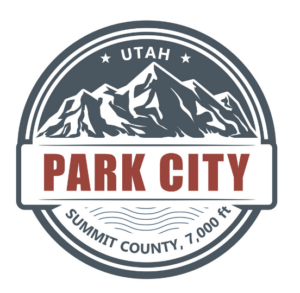 Park City, Utah: Park City leaders on September 5 delayed a decision on whether to adopt ranked choice voting for municipal contests. The elected officials indicated they want to wait for the results of a Utah Valley University study about the impacts of ranked choice voting. Mayor Nann Worel and the Park City Council expect to return to the issue once the results are released, which City Hall anticipates within several months.
Park City, Utah: Park City leaders on September 5 delayed a decision on whether to adopt ranked choice voting for municipal contests. The elected officials indicated they want to wait for the results of a Utah Valley University study about the impacts of ranked choice voting. Mayor Nann Worel and the Park City Council expect to return to the issue once the results are released, which City Hall anticipates within several months.
 Wisconsin Rulemaking: The Wisconsin Elections Commission approved the final text on a permanent administrative rule guiding the conduct of election observers at polling places in the state. After two years of work and multiple rounds of public comment, the rule will now be sent to Gov. Tony Evers who can decide to send it to a legislative committee for final approval. While this is the first permanent rule approved by the commission since the agency’s creation in 2016, the rule won’t be in effect for the election in November. The administrative rule guides how election observers are allowed to act in a polling place, where they are allowed to stand and how close to certain activities they’re allowed to be. The rule also lays out how observers can challenge certain activities they witness; when and how election officials can remove observers from the polling place; and what members of the news media are allowed to do, including taking pictures or video inside polling places. The rule was approved 5-1. Republican commissioner Robert Spindell cast the only no vote after a number of speakers during the meeting’s public comment period objected to some of the rule’s provisions and questioned if it would be approved by the Republicans who control the Legislature’s Joint Committee on the Review of Administrative Rules (JCRAR).
Wisconsin Rulemaking: The Wisconsin Elections Commission approved the final text on a permanent administrative rule guiding the conduct of election observers at polling places in the state. After two years of work and multiple rounds of public comment, the rule will now be sent to Gov. Tony Evers who can decide to send it to a legislative committee for final approval. While this is the first permanent rule approved by the commission since the agency’s creation in 2016, the rule won’t be in effect for the election in November. The administrative rule guides how election observers are allowed to act in a polling place, where they are allowed to stand and how close to certain activities they’re allowed to be. The rule also lays out how observers can challenge certain activities they witness; when and how election officials can remove observers from the polling place; and what members of the news media are allowed to do, including taking pictures or video inside polling places. The rule was approved 5-1. Republican commissioner Robert Spindell cast the only no vote after a number of speakers during the meeting’s public comment period objected to some of the rule’s provisions and questioned if it would be approved by the Republicans who control the Legislature’s Joint Committee on the Review of Administrative Rules (JCRAR).
Legal Updates
 Georgia: Superior court judge Robert McBurney dismissed a lawsuit by a Fulton County election board member linked to election denialists about whether local elections officials can refuse to certify an election. Fulton County election board member Julie Adams filed a lawsuit in May asking a judge to declare that the county election board members’ duties “are discretionary, not ministerial, in nature”. At issue is a Georgia law that says the county officials “shall” certify results after engaging in a process to make sure they are accurate. McBurney dismissed Adams’s lawsuit, saying that she had failed to name the correct party as a defendant. Under Georgia law, the principle of sovereign immunity protects state and local governments from being sued unless they agree to it. But voters in 2020 approved an amendment to the state constitution to provide a limited waiver for claims where a party is asking a judge to make a declaration on the meaning of a law. That is what Adams was trying to do when she filed her suit against the board she sits on and the county elections director. But McBurney noted in his ruling that the requirements very plainly state that any such complaint must be brought against the state or local government.
Georgia: Superior court judge Robert McBurney dismissed a lawsuit by a Fulton County election board member linked to election denialists about whether local elections officials can refuse to certify an election. Fulton County election board member Julie Adams filed a lawsuit in May asking a judge to declare that the county election board members’ duties “are discretionary, not ministerial, in nature”. At issue is a Georgia law that says the county officials “shall” certify results after engaging in a process to make sure they are accurate. McBurney dismissed Adams’s lawsuit, saying that she had failed to name the correct party as a defendant. Under Georgia law, the principle of sovereign immunity protects state and local governments from being sued unless they agree to it. But voters in 2020 approved an amendment to the state constitution to provide a limited waiver for claims where a party is asking a judge to make a declaration on the meaning of a law. That is what Adams was trying to do when she filed her suit against the board she sits on and the county elections director. But McBurney noted in his ruling that the requirements very plainly state that any such complaint must be brought against the state or local government.
The DeKalb County Republican Party has filed a lawsuit against Georgia Secretary of State Brad Raffensperger alleging that the encryption keys for the software used in the state’s Dominion Voting System are not stored securely. The DeKalb GOP wants the Secretary of State’s Office to properly store the encryption keys and “immediately bring the Dominion systems used in Georgia elections into compliance with Georgia law.” The lawsuit alleges that the state’s Dominion system software has been in an “illegal and insecure state since at least 2020,” and that the Secretary of State’s Office has known this since March, 2024. The DeKalb GOP also wants the Secretary of State’s office to make the Dominion system logs, cast-vote records and ballot images available to itself and the public for inspection within 24 hours of polls closing on Nov. 5.
 Idaho: District Court Judge Patrick J. Miller has denied Attorney General Raúl Labrador’s latest legal challenge to a ballot issue that seeks to end the state’s closed party primary elections and create ranked-choice voting in the general election. Miller dismissed Labrador’s motion for summary judgment seeking to have the signatures on the ballot initiative declared invalid. “The evidence the Attorney General submits actually negates the idea that the defendants perpetrated false statements to thousands of persons who actually signed the petition,” Miller wrote in Thursday’s ruling. Labrador had alleged that volunteer signature gatherers supporting the Idahoans for Open Primaries coalition misled the public and fraudulently obtained the signatures used to qualify the ballot initiative for the election. But in a ruling issued less than 24 hours after the two sides were in Ada County District Court , Miller wrote that Labrador’s “principal argument is not well taken for numerous reasons.” “First, the record is devoid of any evidence that the required ballot titles were not included on the initiative shown to voters or that the short title was not on every initiative signature page,” Miller wrote. “As pointed out by defendants’ counsel at oral argument, the short title was in large font on the bottom of every page of signature sheets.” In a statement released Thursday, Labrador expressed disappointment with the ruling, disagreed with the judge and reiterated his objections to the initiative. “At least, our legal challenge has raised awareness about the true nature of the initiative,” Labrador wrote in a statement released by a spokesman. “It is now up to Idaho voters to decide whether they want to replace Idaho’s primary system with a top-four primary system and fundamentally alter Idaho’s orderly general elections with an expensive ranked choice voting system that has resulted in confusion, delays and widespread voting errors in other states.”
Idaho: District Court Judge Patrick J. Miller has denied Attorney General Raúl Labrador’s latest legal challenge to a ballot issue that seeks to end the state’s closed party primary elections and create ranked-choice voting in the general election. Miller dismissed Labrador’s motion for summary judgment seeking to have the signatures on the ballot initiative declared invalid. “The evidence the Attorney General submits actually negates the idea that the defendants perpetrated false statements to thousands of persons who actually signed the petition,” Miller wrote in Thursday’s ruling. Labrador had alleged that volunteer signature gatherers supporting the Idahoans for Open Primaries coalition misled the public and fraudulently obtained the signatures used to qualify the ballot initiative for the election. But in a ruling issued less than 24 hours after the two sides were in Ada County District Court , Miller wrote that Labrador’s “principal argument is not well taken for numerous reasons.” “First, the record is devoid of any evidence that the required ballot titles were not included on the initiative shown to voters or that the short title was not on every initiative signature page,” Miller wrote. “As pointed out by defendants’ counsel at oral argument, the short title was in large font on the bottom of every page of signature sheets.” In a statement released Thursday, Labrador expressed disappointment with the ruling, disagreed with the judge and reiterated his objections to the initiative. “At least, our legal challenge has raised awareness about the true nature of the initiative,” Labrador wrote in a statement released by a spokesman. “It is now up to Idaho voters to decide whether they want to replace Idaho’s primary system with a top-four primary system and fundamentally alter Idaho’s orderly general elections with an expensive ranked choice voting system that has resulted in confusion, delays and widespread voting errors in other states.”
 Iowa: The Iowa Supreme Court heard its first case of the 2024 session at the University of Iowa College of Law. The case centers around Linn County Auditor Joel Miller’s accusation that the Iowa Secretary of State failed to revamp Iowa’s voter registration systems prior to the 2020 presidential election. In 2018, the state’s deputy commissioner of elections notified Iowa counties of their goal to spend roughly $8 million updating Iowa’s voter registration system. After a year, in July 2019, Miller filed a public records request with Iowa Secretary of State Paul Pate. Miller said more than $1 million of that funding should have been spent in fiscal year 2019, and he asked for copies of all correspondence regarding the issue between Pate’s office, public officials, and vendors. When Pate’s office did not issue a response within 10 days, which is the requirement for public record requests under Iowa law, Miller filed a complaint with the Iowa Voter Registration Commission where he alleged Pate did not take action to overhaul the system. In his complaint, Miller argued this failure left Iowa’s voting system vulnerable to hackers. Pate filed a motion requesting the commission dismiss Miller’s complaint, and the commission decided in a 2-1 vote to dismiss Miller’s complaint without a hearing. Miller appealed to the Polk County District Court who also denied his petition. He appealed once again, which elevated the lawsuit to the Iowa Supreme Court. During oral argument, Miller’s attorney James Larew said Miller repeatedly sought information regarding his concern about voter registration in Iowa, to which he received no response. Larew also said if there are violations in the future, they will be difficult to prove without information.
Iowa: The Iowa Supreme Court heard its first case of the 2024 session at the University of Iowa College of Law. The case centers around Linn County Auditor Joel Miller’s accusation that the Iowa Secretary of State failed to revamp Iowa’s voter registration systems prior to the 2020 presidential election. In 2018, the state’s deputy commissioner of elections notified Iowa counties of their goal to spend roughly $8 million updating Iowa’s voter registration system. After a year, in July 2019, Miller filed a public records request with Iowa Secretary of State Paul Pate. Miller said more than $1 million of that funding should have been spent in fiscal year 2019, and he asked for copies of all correspondence regarding the issue between Pate’s office, public officials, and vendors. When Pate’s office did not issue a response within 10 days, which is the requirement for public record requests under Iowa law, Miller filed a complaint with the Iowa Voter Registration Commission where he alleged Pate did not take action to overhaul the system. In his complaint, Miller argued this failure left Iowa’s voting system vulnerable to hackers. Pate filed a motion requesting the commission dismiss Miller’s complaint, and the commission decided in a 2-1 vote to dismiss Miller’s complaint without a hearing. Miller appealed to the Polk County District Court who also denied his petition. He appealed once again, which elevated the lawsuit to the Iowa Supreme Court. During oral argument, Miller’s attorney James Larew said Miller repeatedly sought information regarding his concern about voter registration in Iowa, to which he received no response. Larew also said if there are violations in the future, they will be difficult to prove without information.
 Michigan: A Kalamazoo County canvasser has signed a sworn affidavit pledging to fulfill his legal obligation to certify the November election, in response to a lawsuit brought by the American Civil Liberties Union of Michigan after he originally said he might decline to sign off on the election results. Having reached a satisfactory outcome, the ACLU will voluntarily drop its suit against the canvasser, the organization said. “This is a clear recognition there is no legal defense if you are sued for these things,” said Phil Mayor, senior attorney for the ACLU of Michigan. “This is establishing the principle that if you refuse to certify, you will be held responsible.” The lawsuit stemmed from comments the canvasser, 73-year-old Robert Froman, was reported to have made to The Detroit News last month. Froman, a Republican, said that he believed the 2020 election was stolen from former President Donald Trump, and that if the 2024 election went the same way, he would not certify, the News reported. Trump lost Michigan to now-President Joe Biden by about 150,000 votes.
Michigan: A Kalamazoo County canvasser has signed a sworn affidavit pledging to fulfill his legal obligation to certify the November election, in response to a lawsuit brought by the American Civil Liberties Union of Michigan after he originally said he might decline to sign off on the election results. Having reached a satisfactory outcome, the ACLU will voluntarily drop its suit against the canvasser, the organization said. “This is a clear recognition there is no legal defense if you are sued for these things,” said Phil Mayor, senior attorney for the ACLU of Michigan. “This is establishing the principle that if you refuse to certify, you will be held responsible.” The lawsuit stemmed from comments the canvasser, 73-year-old Robert Froman, was reported to have made to The Detroit News last month. Froman, a Republican, said that he believed the 2020 election was stolen from former President Donald Trump, and that if the 2024 election went the same way, he would not certify, the News reported. Trump lost Michigan to now-President Joe Biden by about 150,000 votes.
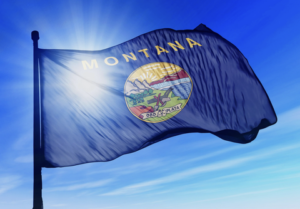 Montana: Secretary of State Christi Jacobsen wants the U.S. Supreme Court to consider whether the Montana Supreme Court wrongfully struck down two voting laws passed by the 2021 Legislature, saying its request gives the court a chance to weigh in on whether state courts have authority to declare unconstitutional any law passed by a state legislature regarding voting and elections. The filing makes clear Jacobsen is pursuing a version of the “independent state legislature” theory that the high court mostly already dismissed in June 2023. In that case, it rejected claims from North Carolina Republicans who argued the state’s Supreme Court wrongfully struck down the Republicans’ congressional redistricting map, which the North Carolina Supreme Court found to be an unconstitutional partisan gerrymander. “State courts cannot ‘read state law in such a manner as to circumvent federal constitutional provisions,’ and ‘arrogate to themselves the power vested in state legislatures to regulate federal elections,’” Jacobsen’s filing with the court says. “But that’s what happened here.” Jacobsen, represented by the Montana Attorney General’s Office and private Virginia-based law firm Consovoy McCarthy, filed a petition for a writ of certiorari – a request for the Supreme Court to consider the case – on Aug. 26 after receiving an extension from the court earlier this year to file her petition. The initial application for an extension of time to file a writ request contained similar arguments as the petition filed in late August.
Montana: Secretary of State Christi Jacobsen wants the U.S. Supreme Court to consider whether the Montana Supreme Court wrongfully struck down two voting laws passed by the 2021 Legislature, saying its request gives the court a chance to weigh in on whether state courts have authority to declare unconstitutional any law passed by a state legislature regarding voting and elections. The filing makes clear Jacobsen is pursuing a version of the “independent state legislature” theory that the high court mostly already dismissed in June 2023. In that case, it rejected claims from North Carolina Republicans who argued the state’s Supreme Court wrongfully struck down the Republicans’ congressional redistricting map, which the North Carolina Supreme Court found to be an unconstitutional partisan gerrymander. “State courts cannot ‘read state law in such a manner as to circumvent federal constitutional provisions,’ and ‘arrogate to themselves the power vested in state legislatures to regulate federal elections,’” Jacobsen’s filing with the court says. “But that’s what happened here.” Jacobsen, represented by the Montana Attorney General’s Office and private Virginia-based law firm Consovoy McCarthy, filed a petition for a writ of certiorari – a request for the Supreme Court to consider the case – on Aug. 26 after receiving an extension from the court earlier this year to file her petition. The initial application for an extension of time to file a writ request contained similar arguments as the petition filed in late August.
 Pennsylvania: A state Commonwealth Court panel decided that voters in the presidential battleground of Pennsylvania can cast provisional ballots in place of mail-in ballots that are rejected for a garden-variety mistake they made when they returned it. The three-member panel ruled that nothing in state law prevented Republican-controlled Butler County from counting two voters’ provisional ballots in the April 23 primary election, even if state law is ambiguous. A provisional ballot is typically cast at a polling place on Election Day and is separated from regular ballots in cases when elections workers need more time to determine a voter’s eligibility to vote. The case stems from a lawsuit filed by two Butler County voters who received an automatic email before the primary election telling them that their mail-in ballots had been rejected because they hadn’t put them in a blank “secrecy” envelope that is supposed to go inside the ballot return envelope. Contesting the lawsuit was Butler County as well as the state and national Republican parties. Their lawyers had argued that nothing in state law allows a voter to cast a provisional ballot in place of a rejected mail-in ballot. They have three days to appeal to the state Supreme Court.
Pennsylvania: A state Commonwealth Court panel decided that voters in the presidential battleground of Pennsylvania can cast provisional ballots in place of mail-in ballots that are rejected for a garden-variety mistake they made when they returned it. The three-member panel ruled that nothing in state law prevented Republican-controlled Butler County from counting two voters’ provisional ballots in the April 23 primary election, even if state law is ambiguous. A provisional ballot is typically cast at a polling place on Election Day and is separated from regular ballots in cases when elections workers need more time to determine a voter’s eligibility to vote. The case stems from a lawsuit filed by two Butler County voters who received an automatic email before the primary election telling them that their mail-in ballots had been rejected because they hadn’t put them in a blank “secrecy” envelope that is supposed to go inside the ballot return envelope. Contesting the lawsuit was Butler County as well as the state and national Republican parties. Their lawyers had argued that nothing in state law allows a voter to cast a provisional ballot in place of a rejected mail-in ballot. They have three days to appeal to the state Supreme Court.
 Tennessee: Nashville Criminal Court Judge Angelita Dalton has restored the voting rights of four people in Davidson County, dissenting from a contentious state requirement that imposed greater restrictions on formerly incarcerated Tennesseans. The Tennessee State Election Commission had required people with prior felony convictions to restore their gun ownership rights before their voting rights. Since many felony charges bar people from owning a gun, the rule disqualified people who would’ve otherwise been eligible to vote again. Both the state and the petitioners cited State v. Jackson, a Tennessee State Supreme Court case which determined a person may regain full citizenship rights without regaining the right to own a firearm. In her ruling, Nashville Criminal Court Judge Angelita Dalton found that while the petitioners may not be able to regain their rights to own a gun, they should have their full citizenship rights restored. “This Court finds that (the petitioner’s) permanent prohibition on possessing firearms does not render her ineligible from having her full rights of citizenship restored,” one of the four orders said. “While the Court acknowledges that Tenn. Code Ann. § 39-17-1307(b)(1)(B) requires that the lifetime firearms prohibition remain in place, the Court also understands that the Tennessee Supreme Court’s holding in State v. Johnson does not require that (the petitioner’s) gun rights be restored before she may have her full rights of citizenship restored.”
Tennessee: Nashville Criminal Court Judge Angelita Dalton has restored the voting rights of four people in Davidson County, dissenting from a contentious state requirement that imposed greater restrictions on formerly incarcerated Tennesseans. The Tennessee State Election Commission had required people with prior felony convictions to restore their gun ownership rights before their voting rights. Since many felony charges bar people from owning a gun, the rule disqualified people who would’ve otherwise been eligible to vote again. Both the state and the petitioners cited State v. Jackson, a Tennessee State Supreme Court case which determined a person may regain full citizenship rights without regaining the right to own a firearm. In her ruling, Nashville Criminal Court Judge Angelita Dalton found that while the petitioners may not be able to regain their rights to own a gun, they should have their full citizenship rights restored. “This Court finds that (the petitioner’s) permanent prohibition on possessing firearms does not render her ineligible from having her full rights of citizenship restored,” one of the four orders said. “While the Court acknowledges that Tenn. Code Ann. § 39-17-1307(b)(1)(B) requires that the lifetime firearms prohibition remain in place, the Court also understands that the Tennessee Supreme Court’s holding in State v. Johnson does not require that (the petitioner’s) gun rights be restored before she may have her full rights of citizenship restored.”
 Texas: Texas Attorney General Ken Paxton is suing Travis County to block an effort to register more voters before the November election. Paxton’s lawsuit follows a decision by the Travis County commissioners to hire Civic Government Solutions to contact non-registered county residents and encourage them to register. Travis County includes Austin. “We just thought it was nice thing to do,” Ann Howard, a Travis County commissioner, said at The Texas Tribune Festival shortly after news of the lawsuit was made public. Paxton, in a statement, called the decision illegal. “Travis County has blatantly violated Texas law by paying partisan actors to conduct unlawful identification efforts to track down people who are not registered to vote,” Paxton said. “Programs like this invite fraud and reduce public trust in our elections. We will stop them and any other county considering such programs.” A spokesperson for the county said the commissioners stood by their decision. “Travis County is committed to encouraging voter participation and we are proud of our outreach efforts that achieve higher voter registration numbers,” said spokesperson Hector Nieto. “We remain steadfast in our responsibility to uphold the integrity of the voter registration process while ensuring that every eligible person has the opportunity to exercise their right to vote. It is disappointing that any statewide elected official would prefer to sow distrust and discourage participation in the electoral process.”
Texas: Texas Attorney General Ken Paxton is suing Travis County to block an effort to register more voters before the November election. Paxton’s lawsuit follows a decision by the Travis County commissioners to hire Civic Government Solutions to contact non-registered county residents and encourage them to register. Travis County includes Austin. “We just thought it was nice thing to do,” Ann Howard, a Travis County commissioner, said at The Texas Tribune Festival shortly after news of the lawsuit was made public. Paxton, in a statement, called the decision illegal. “Travis County has blatantly violated Texas law by paying partisan actors to conduct unlawful identification efforts to track down people who are not registered to vote,” Paxton said. “Programs like this invite fraud and reduce public trust in our elections. We will stop them and any other county considering such programs.” A spokesperson for the county said the commissioners stood by their decision. “Travis County is committed to encouraging voter participation and we are proud of our outreach efforts that achieve higher voter registration numbers,” said spokesperson Hector Nieto. “We remain steadfast in our responsibility to uphold the integrity of the voter registration process while ensuring that every eligible person has the opportunity to exercise their right to vote. It is disappointing that any statewide elected official would prefer to sow distrust and discourage participation in the electoral process.”
 Washington: The Washington State Republican Party is suing King County claiming the elections department illegally used an online tool that helped voters fix problems with their ballot, and that it affected the outcome in the primary race for public lands commissioner. The state GOP alleges that King County Elections Director Julie Wise did not ensure that voter information transmitted over the app had adequate privacy and security protections because the tool is operated by a private company. The party claims Republican Sue Kuehl Pederson would have defeated Democrat Dave Upthegrove in the primary race if the app hadn’t been used. The party wants the votes that were “cured” through the app to be invalidated. The lawsuit comes one day after state officials certified the results of a hand recount in the race that was prompted by an historically close margin. As the results remained too close to call last month, the Pederson and Upthegrove campaigns worked to help voters cure their ballots before the initial results were certified. Those initial results showed Upthegrove won the second slot on the November ballot by just 51 votes over Pederson. The hand recount showed Pederson narrowly losing to Democrat Dave Upthegrove by 49 votes. The lawsuit was filed in Snohomish County Superior Court.
Washington: The Washington State Republican Party is suing King County claiming the elections department illegally used an online tool that helped voters fix problems with their ballot, and that it affected the outcome in the primary race for public lands commissioner. The state GOP alleges that King County Elections Director Julie Wise did not ensure that voter information transmitted over the app had adequate privacy and security protections because the tool is operated by a private company. The party claims Republican Sue Kuehl Pederson would have defeated Democrat Dave Upthegrove in the primary race if the app hadn’t been used. The party wants the votes that were “cured” through the app to be invalidated. The lawsuit comes one day after state officials certified the results of a hand recount in the race that was prompted by an historically close margin. As the results remained too close to call last month, the Pederson and Upthegrove campaigns worked to help voters cure their ballots before the initial results were certified. Those initial results showed Upthegrove won the second slot on the November ballot by just 51 votes over Pederson. The hand recount showed Pederson narrowly losing to Democrat Dave Upthegrove by 49 votes. The lawsuit was filed in Snohomish County Superior Court.
 Wisconsin: The Wisconsin Supreme Court heard arguments this week with whether a Republican had standing to bring a lawsuit that challenges the use of a mobile voting van in 2022 and seeks to ban their use in any future election in the presidential battleground state. Such vans — a single van, actually — were used just once, in Racine in a primary election in 2022. It allowed voters to cast absentee ballots in the two weeks leading up to the election. Racine, the Democratic National Committee and others say nothing in state law prohibits the use of voting vans. Whatever the court decides will not affect the November election, as a ruling isn’t expected until later and no towns or cities asked to use alternative voting locations for this election before the deadline to do so passed. But the ruling will determine whether mobile voting sites can be used in future elections. Much of the oral argument focused on whether the Racine County voter who brought the lawsuit was “aggrieved” under state law and allowed to sue. If the court rules that he didn’t have standing, it could make it more difficult to bring future lawsuits challenging election laws.
Wisconsin: The Wisconsin Supreme Court heard arguments this week with whether a Republican had standing to bring a lawsuit that challenges the use of a mobile voting van in 2022 and seeks to ban their use in any future election in the presidential battleground state. Such vans — a single van, actually — were used just once, in Racine in a primary election in 2022. It allowed voters to cast absentee ballots in the two weeks leading up to the election. Racine, the Democratic National Committee and others say nothing in state law prohibits the use of voting vans. Whatever the court decides will not affect the November election, as a ruling isn’t expected until later and no towns or cities asked to use alternative voting locations for this election before the deadline to do so passed. But the ruling will determine whether mobile voting sites can be used in future elections. Much of the oral argument focused on whether the Racine County voter who brought the lawsuit was “aggrieved” under state law and allowed to sue. If the court rules that he didn’t have standing, it could make it more difficult to bring future lawsuits challenging election laws.
The court also heard testimony in a case focusing on whether guardianship records provided to the Wisconsin Elections Commission when a person has been deemed incompetent to vote should be public record. The case was filed by the Wisconsin Voter Alliance, which alleges there are people who have been found incompetent by a court who are still voting in elections. The group was founded by Ron Heuer, who was part of former Conservative Wisconsin Supreme Court Justice Michael Gableman’s widely criticized 2020 review of the presidential election in the state. Alliance attorney Eric Kardaal started his arguments before the court by citing statistics from Dane County. Liberal Justice Jill Karofsky stopped Kardaal and said the case is limited to Walworth County because that was the focus of the group’s suit. “I’m afraid what you are trying to do is to introduce the fear that there is some sort of illegitimacy going on in the election in the state of Wisconsin, and that concerns me deeply,” Karofsky said. But the bulk of the discussion before the court focused on two conflicting orders from Wisconsin appeals courts based in Madison and Waukesha.
 Wyoming: Joshua Hayden-Ali pleaded not guilty September 5 to criminal trespass, breach of peace and intimidation. The charges originated from an incident on Aug. 6, when Hayden-Ali entered the Laramie County Governmental Complex, allegedly disrupting an election site and tearing up election materials. As of June 29, 2023, Hayden-Ali has been trespassed from the courthouse until 2033. This means he cannot legally be in the courthouse unless he is there for official business, due to several previous incidents of disruptive and threatening behavior. On the day of the incident, Laramie County Sheriff’s Deputy Ramon Colvert responded to a call from a local coffee shop employee. Upon arriving on the scene, Ramon was able to confirm that Hayden-Ali was in the building and had been asked to leave by election officials, whom he ignored. He had been walking through the building, tapping his staff with each step he took. According to court documents, the situation escalated when Hayden-Ali proceeded into the voting area, even though he was asked to leave. He eventually left the voting area, tearing up printed election materials he had picked up and throwing the remnants on the floor. During the incident in the atrium, at least one voter told elections worker Charles Simineo that they were concerned about the safety of election officials, according to the affidavit of arrest.
Wyoming: Joshua Hayden-Ali pleaded not guilty September 5 to criminal trespass, breach of peace and intimidation. The charges originated from an incident on Aug. 6, when Hayden-Ali entered the Laramie County Governmental Complex, allegedly disrupting an election site and tearing up election materials. As of June 29, 2023, Hayden-Ali has been trespassed from the courthouse until 2033. This means he cannot legally be in the courthouse unless he is there for official business, due to several previous incidents of disruptive and threatening behavior. On the day of the incident, Laramie County Sheriff’s Deputy Ramon Colvert responded to a call from a local coffee shop employee. Upon arriving on the scene, Ramon was able to confirm that Hayden-Ali was in the building and had been asked to leave by election officials, whom he ignored. He had been walking through the building, tapping his staff with each step he took. According to court documents, the situation escalated when Hayden-Ali proceeded into the voting area, even though he was asked to leave. He eventually left the voting area, tearing up printed election materials he had picked up and throwing the remnants on the floor. During the incident in the atrium, at least one voter told elections worker Charles Simineo that they were concerned about the safety of election officials, according to the affidavit of arrest.
Opinions This Week
National Opinions: Ranked choice voting | U.S. Postal Service | Election security | Election interference | Early voting | Hand counts | Veteran poll workers | Voter registration | Election workers | Voting Rights Act | Election legislation | Voter fraud
Alaska: Polling place access | Ranked choice voting
California: Ex-felon voting rights | Election legislation | Democracy
Colorado: Ranked choice voting
Connecticut: Absentee voting
District of Columbia: Ranked choice voting
Florida: Election police
Georgia: Election integrity
Iowa: Election security
Maryland: Threats | Voter fraud
Massachusetts: Election fraud
Minnesota: Fair and honest elections
Nebraska: Voting changes
Nevada: Ranked choice voting, II
North Carolina: Student voting rights | Election officials | Ballot reprint
Ohio: Secretary of state, II | Drop boxes | Secretary of state | Democracy
Tennessee: Ex-felon voting rights
Texas: List maintenance
Upcoming Events
From Here to There: How States Can and Should Certify the Results of the 2024 Elections: As we prepare for another fall semester, we’re excited to bring you a robust series of events on the 2024 Elections, Election Law, and the risks facing democracy in the U.S. This webinar will feature Ben Berwick, Head of Election Law & Litigation Team & Counsel (Protect Democracy), Lauren Miller Karalunas, (Brennan Center for Justice), and Michael Morley (Florida State University College of Law). When: September 12, 3:15 pm Eastern. Where: Online
ALL IN on National Voter Registration Day: Boosting Campus Civic Participation: The Higher Education Act requires that nearly all colleges and universities make a good faith effort to ensure that eligible students are registered to vote. To celebrate National Voter Registration Day, Judd Choate will talk to Jen Domagal-Goldman and Ryan Drysdale from ALL IN, a nonpartisan initiative supporting more than 1,000 colleges and universities to increase civic engagement among college students. ALL IN uses campus voter participation data to issue national awards, including statewide recognition through 10 state campus voting challenges in partnership with the nation’s secretaries of state. When: Sept. 17, 12pm Eastern. Where: Online
National Voter Registration Day: National Voter Registration Day is a nonpartisan civic holiday dedicated to celebrating our democracy. Since its kickoff in 2012, the holiday and its team of thousands of Partners have worked to get over 5 million Americans registered to vote in time for their next trip to the ballot box. Celebrated each September, National Voter Registration Day involves dedicated Partners of every stripe from all over the country hitting the streets for a single star-spangled awesome day of coordinated field, digital, and media action focused squarely on growing our shared democracy. When: September 17. Where: Everywhere.
The Experts’ Guide to Free and Fair Elections: Election workers are unsung heroes, working behind the scenes to ensure that our elections run smoothly and securely. Yet many people don’t fully grasp what their job entails, leaving room for election deniers to spread misinformation. This lack of understanding has fueled a disturbing rise in threats, intimidation, and abuse against election officials since 2020. As we approach another critical election marked by rampant misinformation and attacks on democracy, it’s more important than ever to know the facts about election administration. Join The Brennan Center for a live event at 3 p.m. ET on Thursday, September 19, that will spotlight these essential but often overlooked professionals. The discussion will offer a unique opportunity to hear firsthand from the people who make our elections possible as they share their day-to-day challenges and the role that they play in protecting democracy. Speakers: Adrian Fontes, Secretary of State, Arizona; Brenda Cabrera, Former Director of Elections, Fairfax, Virginia; Brianna Lennon, County Clerk, Boone County, Missouri; and Moderator: Natalie Tennant, Former Secretary of State, West Virginia. When: September 19, 3pm Eastern. Where: Online.
Democracy Beyond Elections: Join New America’s Political Reform program, Columbia World Projects, and FIDE – North America on September 26th from 11 am to 12 pm EST for a panel discussion with international practitioners who have designed and implemented citizens’ assemblies at the local, regional, and national levels. This webinar will explore the unique promise and potential challenges of implementing citizens’ assemblies in the United States, exploring questions of how to amplify the voices and preferences of citizens in ways that go beyond the opportunities presented by elections and our current representative institutions. We will hear from Iain Walker, Executive Director at the newDemocracy Foundation; Kenza Occansey, Vice President of Citizen Participation at the Economic, Social and Environmental Council (CESE) in France; and Jonathan Moskovic, Advisor at Democratic Innovations. They will share their experiences using citizens’ assemblies as a tool to deepen democracy and strengthen citizen engagement across Europe and Australia. The discussion will be moderated by Hollie Russon Gilman, Senior Fellow at the Political Reform Program. When: September 26, 11am Eastern. Where: Online.
National Voter Education Week: National Voter Education Week (NVEW) is an open-source and nonpartisan campaign to help voters bridge the gap between registering to vote and actually casting a ballot. During this week of interactive education, voters have the opportunity to find their polling location, understand their ballot, make a plan to vote in person or remotely, and inspire others to get involved. NVEW strives to help voters overcome common barriers to become confident voters and ambassadors of voting in their own communities for every election. When: Oct. 7-11. Where: Everywhere.
Finding Common Ground in Election Law: As we prepare for another fall semester, we’re excited to bring you a robust series of events on the 2024 Elections, Election Law, and the risks facing democracy in the U.S. Co-sponsored by the Office of the Dean, UCLA Law, this webinar will feature: Lisa Manheim (University of Washington School of Law), Derek T. Muller (Notre Dame Law School), and Richard L. Hasen (Director, Safeguarding Democracy Project, moderator). When: October 9, 3:15 pm Eastern. Where: Online.
AI, Social Media, the Information Environment, and the 2024 Elections: As we prepare for another fall semester, we’re excited to bring you a robust series of events on the 2024 Elections, Election Law, and the risks facing democracy in the U.S. Co-sponsored by the Institute for Technology, Law & Policy, UCLA Law, this webinar will feature: Danielle Citron (University of Virginia Law School), Brendan Nyhan (Dartmouth), Nate Persily (Stanford Law School). When: October 21, 3:15 pm Eastern. Where: Online
Vote Early Day: Vote Early Day is a nonpartisan movement of media companies, businesses, nonprofits, election administrators, and creatives working to ensure all Americans have the tools to vote early. Vote Early Day was founded by MTV as a new civic holiday focused on helping every voter know how, where, and when they can vote early. Launched in the midst of a global pandemic, Vote Early Day became a critical resource to ensure no voter had to choose between their health and casting their ballot. In its first celebration, Vote Early Day attracted 134 premier partners and 2,700 general partners from every state in the nation. Over 3,000,000 voters cast their ballots on Vote Early Day alone. When: October 29. Where: In states that allow early voting
Election Hero Day: Election Hero Day recognizes the important work and contributions of poll workers, election administrators, and clerks to ensure efficient and secure elections. Join business leaders, elected officials, nonprofit leaders, and citizens from around the country the day before Election Day to celebrate these heroes of our democracy. When: November 4. Where: Everywhere.
2024 Elections Summit: In an electoral landscape unlike any other, how can we harness this period of rapid change to support the Americans at the front lines of our democracy and build a more resilient electoral system for generations to come? Register and join BPC at our 2024 Elections Summit on Wednesday, December 4, to reflect on the state of U.S. elections with experts from across the country. Hear from practitioners, policymakers, thought leaders, and journalists, who will share lessons learned from 2024 and advance ideas to further strengthen and secure our democracy. This event is co-hosted by BPC and BPC Action and has been designed to meet Congressional Ethics guidelines for a widely attended event. When: December 4, 8am to 5pm Eastern. Where: Online and Washington, DC.
Job Postings This Week
electionlineWeekly publishes election administration job postings each week as a free service to our readers. To have your job listed in the newsletter, please send a copy of the job description, including a web link to mmoretti@electionline.org. Job postings must be received by 5pm on Wednesday in order to appear in the Thursday newsletter. Listings will run for three weeks or till the deadline listed in the posting.
Associate Director, Elections Project, Bipartisan Policy Center– The Associate Director will be responsible for leading the Elections Project’s state and federal legislative engagement efforts. This will include work with election official state associations’ legislative committees, education and outreach to state and federal lawmakers, and coordination with our c4 BPC Action and other federal partners. The Associate Director must be well-versed in election administration and have strong policy, research, writing, and oral communication skills. The position will report to the Director of the Elections Project Rachel Orey and work closely with others on BPC’s elections team. Specifically, the Associate Director will have the following responsibilities: Lead exploratory research effort into state associations of election officials’ legislative committees. Once complete, maintain relationships with associations’ legislative committees, providing policy guidance and legislative support where applicable.Execute the Elections Project’s state and federal advocacy efforts in coordination with BPC Action, BPC’s c4 partner. Manage at least one junior team member, as well as consultants and interns as needed. Assist in establish work plans and the setting of strategic goals related to legislative activities. Assist in the public communication of the project through podcasts, events, media roundtables, and more. Develop (and/or oversee development of) internal and external meeting agendas. Facilitate internal and external meetings, representing BPC Elections and its policy priorities to a broad and diverse audience. Develop and maintain a network of key stakeholders (such as election administrators, peer organizations, funders, state and local government representatives, and more). Coordinate with current funders and support fundraising efforts as needed. Work with communications, development and legislative teams to ensure smooth and productive interaction with each functional area. Significant travel (~20%) required. Travel will not be spread evenly throughout the year and will likely cluster during state legislative sessions and summer conference seasons. Salary: $110k-$130k. Application: For the complete job listing and to apply, click here.
Bureau of Elections Help Desk Agent, Michigan Dept. of State– This departmental technician primarily serves as a help desk customer service representative, providing procedural information about campaign finance, disclosure, notarial acts and election law to candidates, committees, election administrators, notary providers and to the general public. This incumbent will be responsible for tier 1 support and triage for inbound calls and communication to the Bureau of Elections to either resolve or route to the appropriate advanced level support. The incumbent provides additional support for bureau wide project activities and initiatives. Incumbent coordinates the staff that provides coverage for the Bureau of Elections front desk that support in person appointments or customer questions. Salary: $44,678.40 – $61,360.00 Annually. Deadline: Sept. 15. Application: For the complete job listing and to apply, click here.
Cybersecurity Junior Analyst, Palm Beach County, Florida– The Cybersecurity Junior Analyst is responsible for monitoring the organization’s log aggregation tools and triage suspicious activity or detection alerts generated by the security controls implemented within the Supervisor of Elections Office network environment. Additionally, this position will serve as the first line of defense and response for identified security events in accordance with the Information Security Policy, and cybersecurity procedures. Candidate must be organized and personable with a great attitude, be able to work well in a team environment, calmly respond to identified security incidents, and meet deadlines under pressure. Excellent work ethic, including consistent performance, integrity, reliability, and attendance, is a must. Candidate must be detail-oriented and understand the importance of security and safety for all. Must be available 24/7 365, be able to handle simultaneous projects, be a self-starter, and remain informed on emerging threats and technologies. Application: For the complete job listing and to apply, click here.
Deputy City Clerk, North Las Vegas, Nevada— Under general supervision, performs specialized administrative and technical work related to the operation of the Office of the City Clerk. Prepares, processes and distributes City Council Regular, Special and Redevelopment agendas: publishes, mails, and posts agendas as required by the Open Meeting Law. Maintains agenda mailing list. Maintains invocation log and schedules for the City Council meetings. Prepares correspondence including memos to department directors and letters to applicants, representatives and property owners describing the action taken at the various City meetings. Confirms documentation needed on all contracts approved by the City Council and advises contractors of the requirements. Obtains City signatures as necessary. Follows-up on contract expiration dates and notifies appropriate department staff. Attends bid openings. Prepares and distributes meeting minutes, action reports, and summary minutes of public meetings. Publishes, mails, and posts public hearing notices as required by the Open Meeting Law. Prepares City Council Regular, Special and Redevelopment meeting follow-up letters, memos and final action notices; provides administrative support for City Council, commissions, committees, and boards. Performs all related duties in compliance with Nevada Revised Statutes, Nevada Administrative Code and North Las Vegas Municipal Code. Responds to inquiries from the public regarding procedures, activities and other matters that require knowledge of the department’s operations. Ordinance follow-up and log maintenance. Administers agreements which do not need to be approved by City Council. Processes vacations of streets and rights-of-way and annexations; processes bonds, both financial and construction. Responsible for preparing daily, monthly, and annual statistical reporting. Assists in producing election and election related brochures and materials in all necessary languages, including requirements, important dates, methods and means of voting opportunities and necessary documentary evidence required by federal law; acts as filing officer for candidate filing, applications and expense reports. Receives payment from the public in the form of cash, check or money orders; utilizes appropriate cashiering procedures for accepting money, safeguarding the received money and accurately balancing at the end of each day. Performs other related duties as assigned. Salary: $27.01- $42.59/hr Application: For the complete job listing and to apply, click here.
Data Associate, Center for Tech and Civic Life – When you think about elections, you might think about popular candidates, “I voted” stickers, and all sorts of paperwork and deadlines. But behind the scenes are thousands of election officials in state and local governments who are working hard to make sure ballots are counted and voices are heard. At a time when election officials are facing unprecedented challenges and scrutiny, they need support in order to administer secure and inclusive elections and build trust among the public. As Data Associate, you will manage the data behind a new set of standards that make explicit what high performance looks like in U.S. election administration. Think Leadership in Energy and Environmental Design (LEED) certification, but for local election departments. This is big, bold work at the forefront of election administration, so an entrepreneurial spirit will help you succeed. You’ll report to a Senior Program Manager in the Government Services department. Job responsibilities: Collecting data – Develop, document, and implement systems for tracking qualitative and quantitative feedback from tools like surveys, facilitated discussions, and attending conferences. Incorporate organizational data practices into team systems.Analyzing data – Identify themes, trends, and actionable insights that support improvements to the Standards and team processes. Prioritize equity in analysis with a particular focus on CTCL’s priority audiences. This includes voters who are newly eligible, have limited English proficiency, live with disabilities, or are from communities that are impacted by the digital divide or historical disenfranchisement due to race. Sharing learnings – Tailor learnings for a variety of audiences and formats including reports, presentations, blog posts, facilitated conversations, and other formats. Contribute to a culture of continuous learning, data-informed decision making and commitment to priority audiences. Salary: $58,914. Application: For the complete job listing and to apply, click here.
Deputy Elections Administrator, Yellowstone County, Montana – Specialized and responsible administrative work in the Yellowstone County Election office which provides and maintains election reporting management system, ensures polling places meet ADA requirements, maintains voting and tabulating machines, recruits, trains and certifies Election Judges, and assists in organizing and conducting elections in Yellowstone County to comply with State election laws and statutes, to include absentee, mail-in, and advance voting programs, assists with management and direction of voter registration activities, assists with obtaining private, Federal and State grants for ADA compliance needs, assists the Elections Administrator in ballot preparation; does related duties as required. Examples of Duties: Assist with traditional and social media updates, interviews and provide access to certain areas of the Election Management process; Test and maintain voting machines to insure reliable results on Election Day; Recruit, train & certify Election Judges; Coordinate and conduct in person and online training sessions for Chief and Provisional Judges; and Coordinate and conduct in person and online training sessions for Polling Place Managers. Salary: $49,645.44 – $58,406.40 Annually. Application: For the complete job listing and to apply, click here.
Election Assistant, Olmsted County, Minnesota– Under supervision, assists with Olmsted County’s election process. Provides customer service to voters in person, via mail, and through long-term care facility visits. Answers phone calls, directs the public to polling places, monitors supplies, and answers questions. Examples of Work: Assists voters with the absentee voting process; Performs clerical duties including customer service, filing, answering phone calls and data entry to support the election process; Assists on Election Day by answering questions, monitoring supplies, ballot counting, and directing traffic; Processes absentee records on a statewide system; Prepares equipment and supplies for Election Day; Assists with election judge training; and Performs other related job duties as assigned. Salary: $20.13 – $26.88 Hourly. Application: For the complete job listing and to apply, click here.
Election & Project Specialist, Michigan Dept. of State– This position serves as the Project Specialist supporting the Bureau of Election’s (BOE) Elections Operations Division providing accountability and project management functions for bureau wide projects. Incumbent will lead documentation, planning, development, and implementation of projects resulting from the passage of PA 268 OF 2023 – HB4983 expanding Automatic Voter Registration functionality and legislation. Incumbent tracks, monitors and analyzing processes to improve support, integration and security protocols for all applications that integrate with the Qualified Voter File like, but not limited to, the Customer Automotive Records System (CARS). Incumbent will also support implementation of functionality resulting from the passage of PA 257 of 2023 -SB 594. Salary: $61,526.40 – $91,832.00 Annually. Deadline: September 15. Application: For the complete job listing and to apply, click here.
Fellow, Governance, R Street Institute–The R Street Institute—a free-market think tank headquartered in Washington, D.C., and with regional offices across the country—seeks a dynamic fellow to bolster our work on election policy. If you are the right fit, you will report to the director of the Governance program. If you want to join a mission-driven organization and work toward pragmatic policy solutions, this may be the opportunity you need! Your typical day at R Street may include conducting research on how rethinking the structure of elections can create better alignment between politicians and their constituents or drafting an op-ed on the need to ensure safe and secure voting sites. It may also include meeting with legislators, election officials, and other stakeholders to improve public trust in elections or presenting your insights on strengthening ballot security on a radio show or at a national conference. This role will serve within the Governance program, which seeks to define how a limited, effective government can minimize burdens, promote human flourishing, and encourage opportunity for all. With this lens, R Street’s electoral reform work has looked for ways to eliminate needless red tape in elections, ensure all voters can participate in taxpayer-funded elections, realign electoral incentives to promote a healthier political culture, and promote policies that create elections worthy of public trust. All the while, we recognize that keeping states in control of their own elections—an idea at the very heart of our federalist system—will create more public buy-in and allow for greater flexibility and innovation. Our study of electoral reform may touch on a wide variety of issues and will be informed by the framework we have supported in the past. Application: For the complete job listing and to apply, click here.
Field Operations Coordinator, Hays County, Texas– Reporting directly to Election Network Engineer, responsible for overseeing the inventory, distribution, maintenance, warehouse storage, and logistics of all equipment, voting ballots, and department assets for Hays County Elections Department. Responsible for identifying and reserving polling sites including overseeing the coordination of all polling site compliance and usage. Ensures polling locations follow the Texas Election Code for early voting and election day. Oversees the day-to-day tasks of the election technicians’ program. Salary: $46,378 – $50,678. Annually. Application: For the complete job listing and to apply, click here.
IT Assistant Manager, Palm Beach County, Florida– The Assistant IT Manager plays a supportive role in the smooth operation of the IT department, ensuring that both the technical infrastructure and the team are aligned with the organization’s goals. This position involves collaborating closely with the Election Technology Director to oversee the implementation of technology solutions that meet the needs of the organization. The Assistant IT Manager helps maintain an efficient and effective IT environment. Oversee daily operations of the IT department, including help desk operations and performance, troubleshooting issues, and ensuring efficient workflow. Hold department meetings and provide weekly performance summary. Manage IT projects under the direction of the Election Technology Director, ensuring timely completion, budget requirements, and organizational needs. Enforce IT policies and procedures to ensure data security, network access, and system availability. Assist in the management of IT staff by developing skills, coaching, and communicating job expectations. Coordinate vendor renewals, assist with IT budget development, and manage grant applications. Evaluate and assist in maintaining the organization’s disaster recovery and business continuity plans for IT. Assist with IT Public Records requests research and fulfillment. Assist the Election Technology Director in all facets of IT operations. Lead projects and mentor team members. Application: For the complete job listing and to apply, click here.
Operations Associate, NASED– A part-time (approximately 20 hours per week), fully remote, Operations Associate for a small nonpartisan, nonprofit membership association. Reporting to the Executive Director, this new role will support all the organization’s operational needs. The responsibilities of this position will include, but are not limited to, the following: Help update and maintain website content; Help maintain NASED’s social media presence, including developing content and creating basic graphics; Work with NASED’s controller on monthly financial reports and with the auditor and accountant on annual reports and filings; Monitor and assist with responses to inquiries sent to NASED’s shared inboxes; Maintain organization distribution lists; Assist with scheduling Board and Committee meetings; Assist with conference planning, including developing the conference website via the conference management platform, creating and proofing materials, planning activities, and budgeting; Support the execution of two national conferences per year; Create and send annual invoices to organization members and Corporate Affiliate members; and Other duties and special projects as assigned. This position is part-time and fully remote, but the candidate must live in the United States. Travel to support NASED’s Winter and Summer conferences is required (approximately 10 days per year). This position reports to NASED’s Executive Director. This role does not supervise any staff. Application: For the complete job listing and to apply, click here.
Physical Security Specialist, Palm Beach County, Florida– This position is responsible for administration of the physical security programs in a manner consistent with Supervisor of Elections Office policies, procedures, quality standards, and applicable local, state, and federal regulations. These programs include conducting facility security risk assessments, assisting with access control, monitoring alarms and CCTV systems, and providing security related training. Must be organized and personable with a great attitude, be able to work well in a team environment, and meet deadlines under pressure. Excellent work ethic, including consistent performance, integrity, reliability, and attendance, is a must. Candidate must be detail-oriented and understand the importance of security and safety for all. Must be available 24/7 365, be able to handle simultaneous projects, and be a self-starter. Application: For the complete job listing and to apply, click here.
Registrar of Voters, Washoe County, Nevada– Under general direction of the County Manager, plans, organizes, directs and manages the operations of the Registrar of Voters Department; and performs related work as required. The Registrar of Voters plans, organizes, directs and manages the operations of the Registrar of Voters Department; plans, organizes and coordinates elections which includes hiring and training election staff, arranging for voting and training facilities, developing the election database, ensuring accuracy of data, printing ballots, purchasing, maintaining and repairing voting system hardware, ordering, preparing and distributing supplies, and performing all work required by election law. The Registrar of Voters serves as the face of the office and is frequently asked for media interviews and will provide updates and presentations to the Board of County Commissioners. Manages the day-to-day operations of the department; monitors all administrative functions to ensure policies and procedures are being adhered to, and that accurate records and files are maintained. Supervises and directs the maintenance of voter registration records in compliance with federal and state law. The Registrar of Voters works across many County Departments to secure election workers, coordinate technology, and secure adequate facilities. Supervise assigned staff, including interviewing and selecting staff; providing staff training in proper work methods and techniques; assigning and reviewing work; conducting performance evaluations. Develop and administer the department budget to include projecting future budget needs to maintain service requirements and meet changing statutory mandates; develop and implement Department policies and procedures and ensure compliance with Department and County policies and procedures. This is an Open Competitive/Countywide Promotional recruitment being conducted to fill a current full-time vacancy with the Registrar of Voters department. The list established from this recruitment may be used to fill future vacancies as they occur. Salary: $144,393.60 – $202,176.00 Annually. Deadline: October 2. Application: For the complete job listing and to apply, click here.
Registrar of Voters, Juris Doctorate, Washoe County, Nevada — Under general direction of the County Manager, monitors changes in voting and elections at the state and federal level; plans, organizes, directs and manages the operations of the Registrar of Voters Department; and performs related work as required. The Registrar of Voters Juris Doctorate position plans, organizes, directs and manages the operations of the Registrar of Voters Department; stays informed of federal, state and local laws including changes related to elections and the voting process, changes at the Nevada Legislature; drafting and review of bill draft requests related to election process and voting and best practices; testifies at the legislature on behalf of the county and on a national level; works with the Secretary of State’s Office and the Washoe County District Attorney’s Office to determine impact of changes to Washoe County and works with staff on the implementation process of the changes to ensure county compliance. The Registrar of Voters Juris Doctorate serves as the face of the office and is frequently asked for media interviews and will provide updates and presentations to the Board of County Commissioners. Manages requests for confidential election related records and equipment in the County’s custody and navigating complex public records requests from local and national media. Assist with identification, preparation, and response to potential AI threats. The Registrar of Voters works across many County Departments to secure election workers, coordinate technology, and secure adequate facilities. This is an Open Competitive/Countywide Promotional recruitment being conducted to fill a current full-time vacancy with the Registrar of Voters department. The list established from this recruitment may be used to fill future vacancies as they occur. Salary: $169,852.80 – $237,785.60 Annually. Deadline: October 2. Application: For the complete job listing and to apply, click here.
Senior Regional Engagements Specialist (Remote), EI-ISAC– CIS is in search of a proven, capable, confident, competent, and dynamic self-starter who is passionate about working collaboratively to achieve meaningful and lasting impacts on the security maturity of State, Local, Tribal and Territorial (SLTT) government agencies and entities, including public sector education. This position is within the Elections Infrastructure Information Sharing and Analysis Center (EI-ISAC), a division of CIS. The ideal candidate will be comfortable building and supporting relationships within an assigned region of the United States; interfacing with State Chief Information Officers (CIOs), State Chief Information Security Officers (CISOs), executive level staff, as well as technical staff and US DHS Cybersecurity and Infrastructure Security Agency (CISA) partners. This position will provide exceptional service to SLTTs while expertly informing on the solutions and services that can protect their technology. The Center for Internet Security (CIS) makes the connected world a safer place for people, businesses, and governments through our core competencies of collaboration and innovation. We are a community-driven nonprofit responsible for industry leading best practices for securing IT systems and data. We lead a global community of IT professionals to continuously evolve these standards and provide products and services to proactively safeguard against emerging threats. Salary Range: $69,100 – $104,600. Application: For the complete job listing and to apply, click here.
Registration & Elections Manager, DeKalb County, Georgia– The following duties are normal for this position. The omission of specific statements of the duties does not exclude them from the classification if the work is similar, related, or a logical assignment for this classification. Other duties may be required and assigned. Manages, directs, and evaluates assigned staff; develops and oversees employee work schedules to ensure adequate coverage and control; compiles and reviews timesheets; approves/processes employee concerns and problems and counsels or disciplines as appropriate; assists with or completes employee performance appraisals; directs work; acts as a liaison between employees and management; and trains staff in operations, policies, and procedures. Organizes, prioritizes, and assigns work; prioritizes and schedules work activities in order to meet objectives; ensures that subordinates have the proper resources needed to complete the assigned work; monitors status of work in progress and inspects completed work; consults with assigned staff to assist with complex/problem situations and provide technical expertise; provides progress and activity reports to ; and assists with the revision of procedure manuals as appropriate. Conducts elections; manages personnel to ensure that all elections are conducted in accordance with state and federal laws and regulations; secures early voting locations and recommends schedules; appoints site managers and determines staffing requirements for early and election day voting; works with polling location personnel and county information technology and GIS staff to ensure provision of technology training and services; develops and reviews training for compliance with election laws; monitors early voting traffic; recommends changes in procedures to resolve issues; conducts election night precinct check-in, election audit and preparation of precinct statistics; monitors election tasks lists; monitors election software programming; and oversees financial filing process. Implements, monitors and maintains registration functions and processes; reviews registration functions and processes including felon registrations, duplicate voters, citizenship verifications, jury summons questionnaires, provisional voting, election night precinct check-in and election audit; monitors and ensures compliance with established protocols and procedures; and updates protocols and procedures as needed. Prepares and completes a variety of registration, production and election reports; compiles and/or tracks various administrative and/or statistical data; generates and prepares data; submits all mandated reports to local, state and federal regulatory agencies or others as required; and maintains related records. Maintains training and procedure manuals; and develops, updates, and revises procedural manuals for voter registration and election functions. Interprets, applies, and ensures compliance with all applicable codes, laws, rules, regulations, standards, policies and procedures; initiates any actions necessary to correct deviations or violations; maintains comprehensive, current knowledge of applicable laws/regulations and pending legislation that may impact department operations; and maintains an awareness of new products, methods, trends and advances in the profession. Assists in developing and implementing department budget; reviews budgetary needs and makes recommendations to executive management; and monitors expenditures against approved budget. Salary: $68,778 – $110,732 Application: For the complete job listing and to apply, click here.
Marketplace
electionline provides no guarantees as to the quality of the items being sold and the accuracy of the information provided about the sale items in the Marketplace. Ads are provided directly by sellers and are not verified by electionline. If you have an ad for Marketplace, please email it to: mmoretti@electionline.org